#cook:もずく
Photo

✿ ねばねば丼
✍️ 鮭ほぐし,もずく。タレ→めんつゆ×紫蘇チューブ。
#cook:ネバネバ丼#cook:ねばねば丼#cook:丼物#cook:納豆#cook:鮭ほぐし#cook:2020〜#cook#cook:主食#cook:オクラ#cook:もずく#cook:紫蘇チューブ#cook:めんつゆ#cook:紫蘇チューブ×めんつゆ#cook:まぐろ#cook:ながいも#cook:ねばねば#レシピ:鮭ほぐし#2020〜
15 notes
·
View notes
Photo
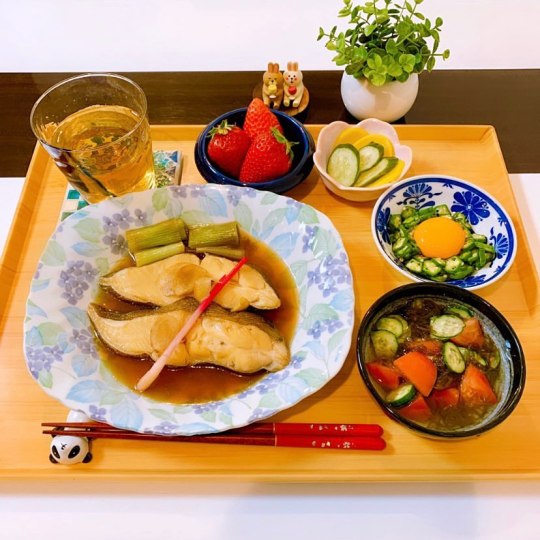
なう(2023/03/10 19:30:47) 今夜はカラスガレイの煮付け🐟 肝の煮付け食べたいなぁ🥺週末 魚のアメ横行こうかな??? #カラスガレイの煮付け #もずく酢 #月見おくら #奈良県産苺ならあかり #家飲み #おうち居酒屋 #おうちごはん #お家ごはん #おうちごはん部 #おうちごはんlover #今日の晩ごはん #TodaysDinner #晩ごはん #晩ごはん記録 #献立記録 #自炊記録 #てづくりごはん #手作りごはん #てづくりごはん365 #cooking #cook365 #タベリー #フーディーテーブル #クッキングラム #キッチングラム #いいね返し #夫婦ごはん #ふたりごはん #豊かな食卓 #家庭料理 最近映画も飽きてきたしGWの予定でも 立てよーと思て新潟⇔ベトナム直行便の 予約をしようと思たら何と😳⁉️ 新潟からはホーチミンでもハノイでもなく ダナン行きの✈️しかないやとー😱?💦 ダナンみたいなビーチリゾート行くんやったら ベトナムじゃなくてもえーわ😭 ベトナムさを感じたいのに何でダナンなん😫 成田空港まで7時間かけて車かバスで行くか 関空でトランジットして割増で行けば ホーチミン行けるけど無駄にしか思えん😭 せっかく新潟空港歩いて行ける範囲に住んでるのに 成田やら大阪まで行ってから…なんて事は 絶対したくない😂😂😂 昨日ベトナムるるぶも買ったのに最悪や 新潟空港使えねー🤪仕切り直しやな😢 https://www.instagram.com/p/CpmwJJCyai3/?igshid=NGJjMDIxMWI=
#カラスガレイの煮付け#もずく酢#月見おくら#奈良県産苺ならあかり#家飲み#おうち居酒屋#おうちごはん#お家ごはん#おうちごはん部#おうちごはんlover#今日の晩ごはん#todaysdinner#晩ごはん#晩ごはん記録#献立記録#自炊記録#てづくりごはん#手作りごはん#てづくりごはん365#cooking#cook365#タベリー#フーディーテーブル#クッキングラム#キッチングラム#いいね返し#夫婦ごはん#ふたりごはん#豊かな食卓#家庭料理
1 note
·
View note
Text
YouTube Channels for Kids by JLPT Levels
(。•̀ᴗ-)✧ resources

こんにちは, Japanese learners! Learning a language is an exciting adventure, isn't it? To add a spark of joy to your Japanese learning journey, here's a collection of YouTube channels tailored for kids. Organized by JLPT levels, these channels offer a blend of education and entertainment for learners at different stages. Keep in mind, though, that JLPT levels aren't an exact science like math – language learning can be subjective in terms of difficulty. However, these resources provide a fantastic starting point and a fun way to explore the world of Japanese language and culture. Let's hop into this delightful world of animated learning and playful discoveries!
Friendly reminder to adjust your way of learning in order to make the most of what you're studying to reach the goal you truly want! read my post about it (ᵔ◡ᵔ)
꒰ა ˚₊ ✧・┈・╴N 5 ╴・┈・𐑺 ‧₊˚໒꒱
— Curious George (N5 level)
— Japanese folk tales/anime series (Japanese audio/Japanese subtitles) from BomBom Academy (N5 level)
— Peppa Pig (N5-4 level)
— Anpanman (N5-4 level)
— NHK education (N5-4 level)
꒰ა ˚₊ ✧・┈・╴N4 ╴・┈・𐑺 ‧₊˚໒꒱
— Cinnamon Roll, Sanrio (N4 level)
— [Anime] Atashin'chi (N4-3 level)
꒰ა ˚₊ ✧・┈・╴N3 ╴・┈・𐑺 ‧₊˚໒꒱
— Sesame Street Japan (N3 level)
— Chibi Maruko Chan (N3-2 level)
꒰ა ˚₊ ✧・┈・╴N2 ╴・┈・𐑺 ‧₊˚໒꒱
— Precure (N2 level)
またね~@inkichan
꒰ა ˚₊ ✧・┈・╴﹕꒰ ᐢ。- ༝ -。ᐢ ꒱﹕╴・┈・𐑺 ‧₊˚໒꒱
#japanese#nihongo#studyblr#learn Japanese#learning Japanese#japanese langblr#langblog#japanese studyblr#日本語#study japanese#japanese resources#free resources#resources#japanese free resources#youtube#JLPT#JLPT N5
283 notes
·
View notes
Text
MPW Ep 2 Subtitle Corrections
Subtitle Corrections: Ep 1 here
Cultural/Language Tidbits: Ep 2 here
Same translation disclaimer applies. Thanks to everyone reading the first post and geeking out with me in the notes, I really appreciate it XD Ok, Ep 2, let's go! Sorry in advance for the length!
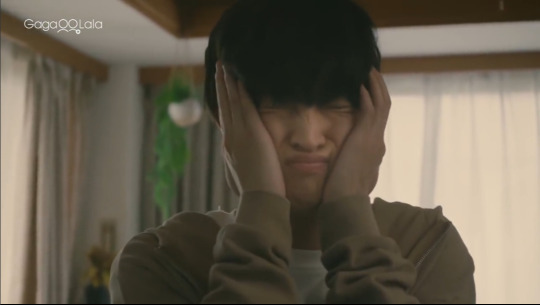
If you're wondering why Yoh's freaking out about the rainy season even though they've been together for 3 years, the manga artist posted a clarification on twitter:
By the way, “it’s been 3 years since then” – that phrase refers to it being 3 years since that conversation regarding the slave contract. As for living together, they’ve only just started (to do so) around Mar/April*, so (at this point) it’s only been a few months (for them).
What if (I) got it wrong…. I remember making a note of it, but the file that I wrote it in and passed over (to the crew) couldn’t be found right, so… (was it) a dream?”
*Japan's rainy season comes around June/July, so this means that this is the first rainy season these two have been experienced together.
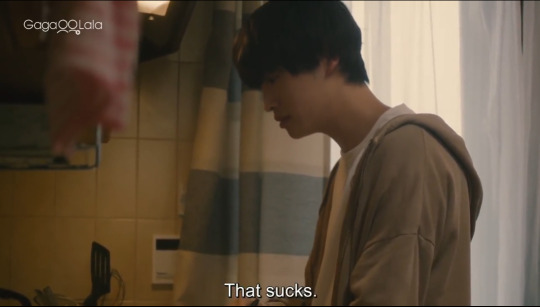
[Y: まずっ]
Y: Tastes bad
In case the original "that sucks" sounds like Yoh might be talking about the news of the young forecaster - he's really just talking about the food here.
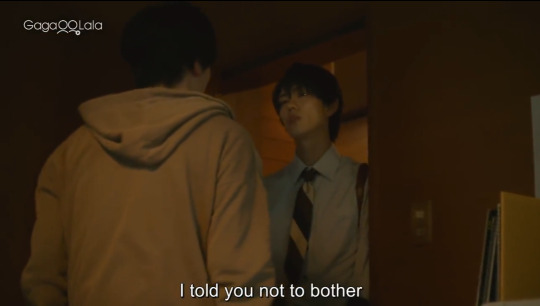
[S: 遅くなるからいらねぇっつっただろう]
Original: I told you not to bother since I returned late
Mine: I told you I wouldn't need it cause I'd be late right?
This is actually a pretty harsh sounding line tbh. It's sort of inkeeping with Segasaki's curtness, but still pretty harsh - so this tells us he's tired after a long day, and explains the frown on his face that Yoh just wipes away with his cuteness

Nikujaga literally means meat and potatoes. It's a stewed dish and a very well-loved comfort food. Super easy to make too (link goes to an easy to follow recipe, and the site also explains a little about the dish).
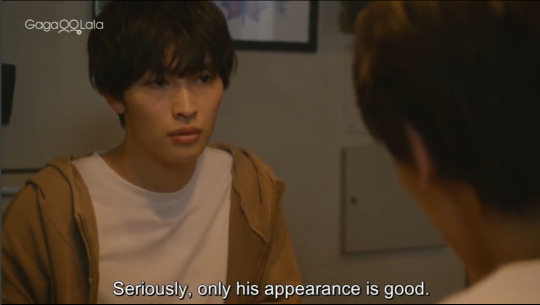
[Y: 本当、顔だけはいいよな]
Y: Really, it's only his face that looks good.

I've talked about this in my cultural/language tidbits for this episode (linked up top) but I'll add it here for completion's sake
[Y: あ、いや。なんでもない…です*]
(Ah, iya, nandemonai…desu*)
Y: Ah, no, it's….nothing*
Yoh let's his sentence trail off before tacking on a "desu" at the end. "Desu" is an ending verb characteristic of "polite" speech, which Yoh doesn't use frequently with Segasaki (in fact, by this point, he has not used polite speech with Segasaki at all, except for maybe saying the full form of the word "welcome home", and even that's pushing it). Here he adds it at the end as an afterthought (the polite form of "iya" would be "iie", if he had wanted the whole sentence to be polite from the get go), which tells us that Yoh's feeling a little off-kilter here, and does introduce the slightest distance between him and Segasaki. We'll see this distance increase as the episode goes on.

[Y: いや、どう考えても食べ過ぎだろう]
Y: No but, no matter which way you look at it, (he's) eaten way too much hasn't he?
Btw, if your hair started standing at the spoon scraping the pot - in the manga artist's post about visiting the shooting venue (as well as during Ep 1 twitter space) it was mentioned that Mashiko, the actor, can actually cook, so during filming they had to tell him what someone who can't would likely do, and also asked him to do the housework poorly (because Yoh's not supposed to be good at cooking or housework hahaha)
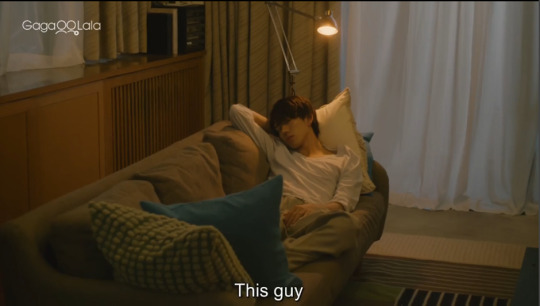
この人*、明日も朝早いんだよな。たぶん。
Original: This guy, has an early morning again tomorrow. Probably.
Mine: This person*, has (to leave) early tomorrow morning too. Probably.
*The word here is "kono hito", literally "this person". There's actually nothing wrong with the translation "this guy" tbh because that's a fairly neutral term in English, but I'm highlighting it here because in his monologues, Yoh usually refers to Segasaki using much rougher language, such as "koitsu, aitsu", except when he addresses Segasaki directly in his head. I'll talk more about how Yoh addresses Segasaki in the analysis post, but for now - this sentence hints that Yoh has clocked Segasaki's tiredness (subconsciously or not) and is feeling a little bad for him. Then again he quickly hides that by adding on "probably". (Adding the word "probably" behind your sentence is a common way to express doubt/negate what you just said, and incidentally is commonly used by comedians to deliver a punchline).
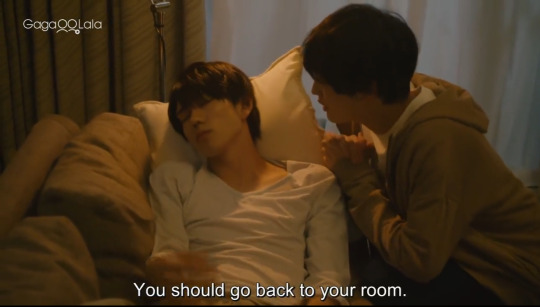
[Y: あの*…あの…寝るなら部屋でとおもって。]
Original: Um… Hey… You should go back to your room.
Mine:
Um*... Um... if you're going to sleep then, (it would be better to sleep) in your room - at least that's what I thought...
*"あの…" (ano…), translated as "um" here, is a common sound you use when you want to get someone's attention but don't want to sound too demanding - it actually isn't being polite per se, but it does show the hesitancy with which Yoh approaches him. Contrast this with the way Segasaki gets Yoh's attention (so far it's just been "Yoh" or "Oi" - the latter of which you would NOT use unless you were close to the person, or looking for a fight).
As a general rule of thumb, the level of politeness in Japanese is directly correlated with the length of the sentence and just how far you can beat around the bush. So, Yoh's suggestion that Segasaki goes to sleep in his room is literally just "if sleeping, then room..." and everything else in that translation is assumed. He may not being using polite speech forms here (that would be "to omoimashita" instead of "to omotte") but this is still a common way to be polite because he's making a suggestion that is so mild Segasaki can choose to ignore it. This is a great example of Brown & Levinson's "negative politeness" which we'll revisit when analysing their speech patterns, and which you can read about in entirely too much detail here (free to read).
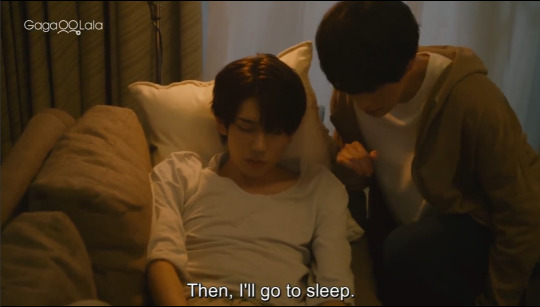
[Y: じゅあ、俺は寝るので**
あの、その、そういうことで、おやすみ]
Original:
Then, I’ll go to sleep.
That…sort of thing. Good night.
Mine:
So then, I'm going to bed, therefore**...
Um... that... with that... night!
"Therefore" is an awkward translation for the word ので (node), which is more often translated as "so". I've chosen to use that word because "node", whilst again not a polite form per se, is less colloquial than the more commonly used "から(kara)", to mean the same thing. It tends to pop up more in writing than in speech. "Therefore" doesn't make a sentence polite/formal in English, but it's definitely less colloquial than using the word "so". The use of "node" is just that tiny bit out of place in this sentence paired with the informal pronoun "ore" for "I" as opposed to the more formal choice of "boku".

Again, Yoh answers Segasaki properly here with a "はい (hai)" as opposed to his usual "un" (which is a sound that expresses agreement), when told that Segasaki will be late again. There actually aren't very many moments where Yoh does speak politely to Segasaki (he's definitely rude when he talks about Segasaki in his head hahaha), so these moments stand out. This whole short exchange, together with the random -desu he added earlier, just make Yoh's sentences a little more stilted/awkward, and more distant. Individually they don't deserve much mention at all, but together, and in the context of his jealousy, show just how unsure Yoh is about where he stands with Segasaki.
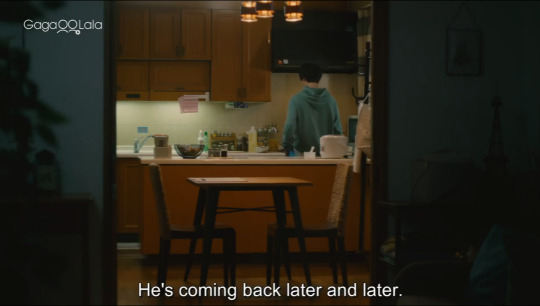
[Y: あの人の帰宅が遅くなり]
Y: That person returned home later and later
"That person" - similar to the above usage of "this person". This sentence is incomplete - the verb form of the last word - 遅くなり (osokunari) indicates that there should be a second part to the sentence (the "completed" form would be osokunatta). But after he says this, there is a pregnant pause, as Yoh puts his phone down and continues cooking alone. The pause continues all the way into the next scene, before the sentence continues, highlighting the loneliness that Yoh feels.

[Y: 当然、触れられることもないままに]
Original: Of course, he did not touch me at all
Mine: (and) of course, (I) remained untouched (by him) as well
The literal translation for this would be "(the situation in which I) was not touched (by him) continued on as well". Yoh uses the passive form of the word "touch", which places the emphasis on Yoh "receiving" the action of being touched as opposed to placing the emphasis on Segasaki "carrying out" the action of touching Yoh. Consider the difference between the sentences "I was hurt by him" and "he hurt me". The former is the passive form, and is super common in Jp, much less common in Eng. If this is confusing - welcome to Jp grammar just know that the emphasis of this line is more on what Yoh does not have, rather than what Segasaki has not done. It accentuates Yoh's feelings of emptiness and loss.
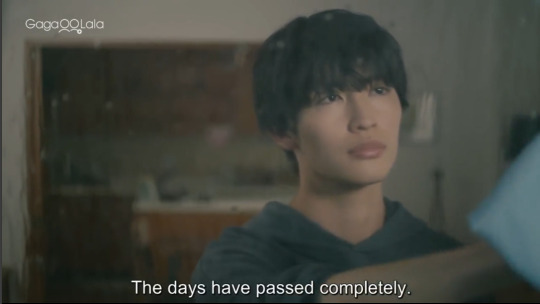
Y: すっかり日々は過ぎて
Y: The days pass by completely ...
Similarly, this sentence is "incomplete", and is instead continued by Segasaki walking in and telling Yoh he'll be late again. (This whole bit just hurts my soul tbh, Yoh is so lonely. )
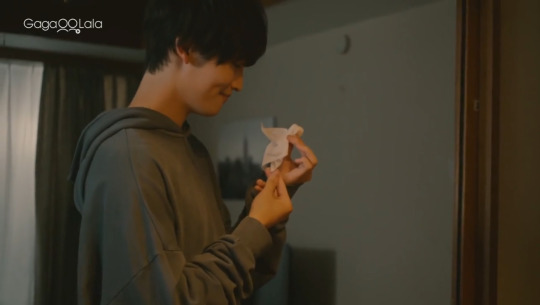
This is a teruteru bouzu aka a charm of sorts for good weather. See the cultural tidbits post for Ep 2 linked up top for more info!

This is said really strongly, and gives the "what the hell are you doing" feel. Yoh's truly upset here.

I try not to care about some of the subs in these side conversations because they don't add much to the main story and these posts are already too long, but this sentence should really be "Dammit, maybe I should (go) troll the chat" (and the previous sentence should be "If this was broadcasted in a certain country it would be instant death" aka N.Korea ^^;) and I just think it was a nice touch to hint at the fandom wars/flaming that goes on between fans hahaha
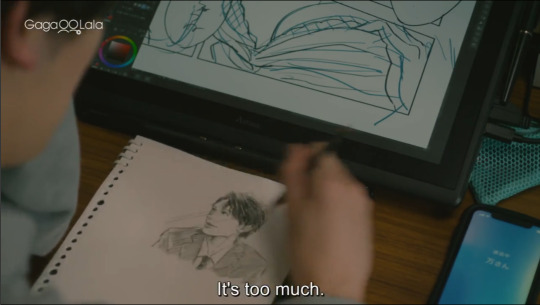
[Y: しんどい]
Y: This is too draining
The word here used is "shindoi", which is a term used when you're feeling mentally/physically exhausted/drained, and carries a sense of frustration (at feeling this way) and sometimes (emotional) pain.
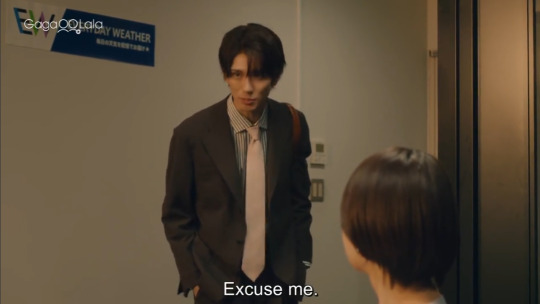
This. Is. Huge.
Segasaki does 2 things here - one, he rejects an after-work meal, which you rarely do because Japan is all about the group and rejecting a group invite, to welcome a new member, can make you seem like you aren't a team player - two, the guy who invites him is his senior, which you can tell because Segasaki sticks to polite speech forms whilst the other guy does not. It's still relatively casual, so you can tell he's got a good working relationship with them (probably why he's not worried about rejecting them) but still. In Segasaki's world, Yoh is the No. 1 priority.
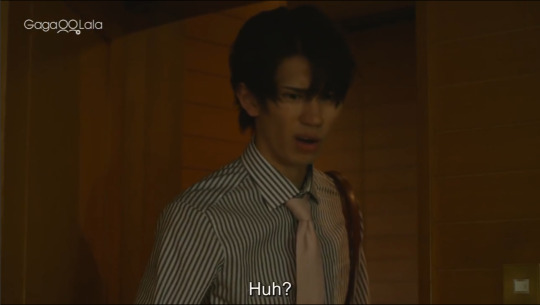
This is more accurately "WTF". There are many sounds in Japanese that aren't exactly words, but carry a lot of meaning - "Haa?!" is one of them, and is a very rude way to express a lot of anger and shock. Please, never say this in real life. You will royally piss off whoever it's directed at and if you are outside a Shibuya bar you will get punched.
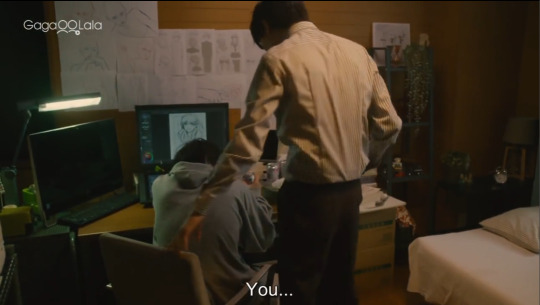
The word used here is てめぇ (temee), which is a really rude way to say "you", and has the same energy as "you bastard". Segasaki usually uses the informal pronoun "omae" for "you" when he talks to Yoh, he's definitely pissed off here.

This is the same word, "shindoi" again.
I'm going to put the rest of the whole argument here with just my translation because it's too long to screencap the whole thing.
[S: 何なんだよ?このエロい惨状は
Y: うるさい。
Y: 俺は売れっ子エロ漫画家になるんだ
S: なんだそりゃ。おい *takes away beer can*
Y: 売れっ子さんが シコリながらネーム描くと いいのができるって言ってた
S: なんも描けてなかったぞ。
S: おい、だめだっつってんの
S: 飲みすぎ 出すもん出して 寝てただけだろう
Y: 黙れ!
Y: 俺はエロくて 抜ける漫画描いて いっぱい稼いで
Y: 早く こんなとこ出ていくんだ
S: はあ? おい、お前 どういうつもりだよ
Y: どうもこうもないよ!
Y: 平気で抱かれてると思うなよ 。
Y: 俺のこと、好きでもないくせに
Y: 便利な奴隷としか思ってないんだろう?そんなにやりたきゃ隣のキャスターとやってろよ
S: お前 さっきから 何を...
Y: 俺はあんな風に笑いかけられたことない]
Breakdown:
S: What's up with this? This lewd disaster of a scene
Y: (You're) annoying!
["うるさい (urusai)" is often translated as "shut up", but it literally means someone is being "noisy", and here is more of a complaint that Segasaki is being bothersome]
Y: I'm going to become a hot-selling erotica manga artist!
[the word used here is 売れっ子 (urekko), which literally means "someone who gets huge sales" and mostly refers to idols, entertainers, TV personalities etc. So Yoh is not just saying he's going to become popular, he's saying he's gonna be like a celebrity manga artist, which is why Segasaki snorts a little at this]
S: What's with that? Hey. *takes away beer can*
Y: The hot sellers say that if you jerk off whilst drawing your storyboard, you'll come up with good stuff
[urekko-san is a pretty cute way of referring to these popular artists]
S: You've not drawn anything, you know? [this is said with a really indulgent air, which contrasts directly with the more authoritative tone of the next line]
S: Hey, I'm telling you no more *grabs beer can*
S: You drank too much. You just shot what you shot and then went to sleep didn't you?
[And this is back to an indulgent tone - also, everyone knows Segasaki is talking about cumming here, he just doesn't actually say it so directly]
Y: Shut up! ["黙れ (damare) - contrast with "urusai" earlier. The former is used much less commonly and really does mean to "be quiet". This is why Segasaki pauses and looks at Yoh. Up until now Segasaki just thinks Yoh's gotten drunk and is whining cutely, but this word means things are serious.]
Y: I'm going to draw manga that is erotic, that you can wank off to, and then earn lots of money [this is a call back to the conversation with Man-san over the phone in Ep 1, which I did not include earlier because I didn't think it was important to the story when Yoh says "the work that was released last month was amazing! There was a big buzz around the topic "I can't wank off (to this)" - Yoh was being sarcastic here, meaning that he got reviews that his work wasn't erotic enough]
Y: and leave this sort of place soon!
S: What? Hey - what (the hell) are you thinking? [Again, "haa?" here shows he does NOT like what Yoh's saying, but he does soften the end of the sentence with a "yo"]
Y: I'm not thinking of anything!
Y: Embracing me so easily - don't think you can (keep on) doing that [again, this is the passive form, so the emphasis is on Yoh being embraced, and here has the nuance of "don't think I'll just (keep on) being fine with being embraced (by you) like it's some sort of norm"]
Y: when you don't even like me [this line has quite a bit of bitterness in it - the emphasis here is strongly on Segasaki and his apparent "non-liking" of Yoh my english is dying.]
Y: You think of me as just a convenient slave, don't you?
Y: If you want to do it that much, go do it with that forecaster next to you!
S: You... from the start... what have (you been saying?)
Y: I have never been smiled at like that before [again, this is in passive voice]
It's obvious from the acting alone that this entire argument is pretty emotionally charged - this is also reflected in the language because Yoh uses the pronoun "ore (I)" a lot. Pronouns are frequently dropped in Japanese - often you can go an entire conversation without ever uttering the words "I/me" or "you", in part because the pronouns are assumed and also because emphasis on an individual can come across as too selfish/narcissistic or direct. Segasaki uses them often enough with Yoh, which fits his personality, but Yoh normally doesn't. So, when he uses "ore" here it stands out - his plans to be successful and leave, his feelings, his interpretation of Segasaki's actions - all of the emphasis is on his own self. The message is very clear - Yoh is hurting a lot more than he is blaming or accusing Segasaki.
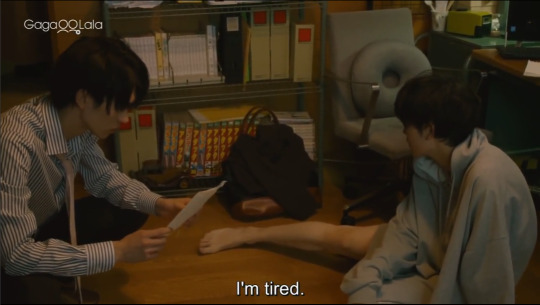
[Y: もう疲れた。あんたといると疲��る。嫌いだ
S: お前 酒入るとめちゃくちゃしゃべるんだな
Y: ねぇ、何で雨の時はだめなの?
S: はあ? だって、お前が言ったんだろう]
Y: (I'm) tired out. When (I'm) with you, (I) get tired. Hate it.
[We've lost the "I" pronouns here, because the emphasis is on the extreme sense of physical and emotional fatigue as opposed to Yoh himself, and on how much he dislikes that feeling. Of note, "hate" here is closer to "detest/really dislike" - the word is "kirai" - which is not as strong as the word "nikui" which we talked about in Ep 1 when Yoh said he hated the part of him that always listened to Segasaki. Also, this is the first time Yoh has addressed Segasaki with the pronoun "you" out loud - he uses "あんた anta", which he also used in his head in Ep 1, after they did it. Again, we'll talk about this in the analysis post in the future, but for now just know that this term is usually used between older couples.]
S: You... once you start drinking you really start talking huh? [literally, you "become able to talk"]
Y: Hey...why is it when it rains, (we) can't do it?
S: What? Because, you said so didn't you? [the last "haa?" from Segasaki! This time expressing his surprise and slight indignation.]
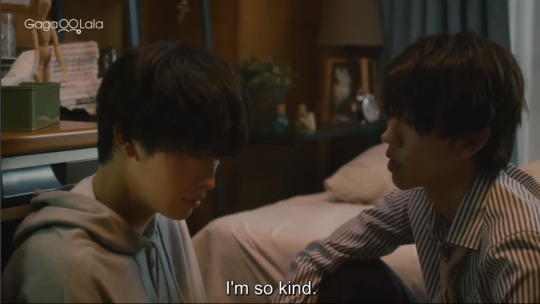
[S: 俺は優しいんだ]
S: I. am. Kind.
Great example of Segasaki's use of the "ore" pronoun here to quite literally emphasise how great he is. "優しい (kind)" in Japanese carries the connotation of being thoughtful, anticipating the other person's needs and wants and then meeting them etc. It's a characteristic that people often say they look for in their potential partners.
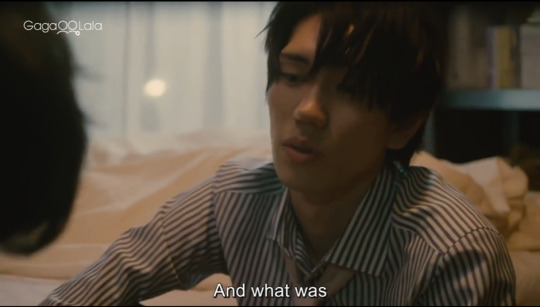
[S: そもそも、なんだ先の言いぐさは
好きじゃないだの 出ていきたいだの
お前 俺のプロポーズを受けといてよくそんなことが言えんな
S: 養ってやる*っつってんだ プロポーズ以外になに]
S: In the first place, what was with those things you said earlier? That you don't like me, that you want to leave...
You... that was rich, saying all that after accepting my proposal.
S: I was saying I'd provide and care* for you. If that's not a proposal than what is?
["養ってやる" is a pretty possessive way to say I'll provide for you - it's the same word used when referring to parent providing for a child, or an owner providing for a small animal. It's not rude per se, but it does imply a power imbalance. Segasaki actually sort of has a point here because... this is not something you say to someone else unless you're in a relationship ^^;]

S: ていうかお前、俺のこと嫌いなんだ
S: どうなの
S: Actually about that... so you hate me huh?
S: Which is it?
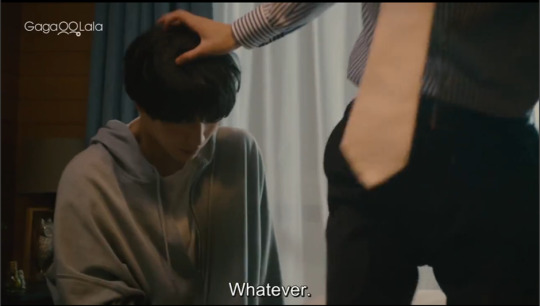
S: ふーん。あ、そ
S: Ohh..? I see.
ふーん (Ohh..?) - Segasaki says this a lot, especially in this episode. This is another one of those sounds that isn't a word but carries a lot of meaning. It has a dismissive sort of tone to it, like you've already assumed something or when you're pretty nonchalant/not impressed about whatever the other person has said and are just playing along with them by giving them some attention (so again, if you use it wrongly, it can piss people off). Segasaki uses it whenever Yoh goes mute or shy, as a way to tease Yoh - though Yoh seems to think Segasaki is dismissing/not interested in his answer.
あ、そ (A, so) - again, Segasaki says this a lot - can be interpreted as "oh really?/I see/is that so?" - Combined with the above, you can see why Yoh often thinks Segasaki isn't interested in his answer, and even when he does recognise it as teasing, he gets too flustered to do anything about it.
This seems to have gotten longer, if you reached the end - congratulations! I hope this makes it a little clearer why it's so obvious to us as the viewer that Segasaki is really quite patient with Yoh, and is waiting for him to come to terms with his feelings, but at the same time so confusing for Yoh, because of the way many of these interactions can be read both ways. In Ep 3, we'll really be able to get into their dynamics because they've got so much more interaction together.
#my personal weatherman#taikan yohou#体感予報#MPW subtitle corrections#mytranslations#finally got it out#doing a breakdown of the argument was very fun#this is like the most indulgent t/n ever#i am indulging myself the same way segasaki indulges yoh#thanks to everyone for reading my indulgent notes#please geek out with me more#these two are so perfect for each other#sorry I wanted to get Ep 3 and the analysis out before Ep 4 but it's not happening
192 notes
·
View notes
Text
“Shut Up and Eat” yakiniku omake — original Japanese dialogue analysis and translation
The 3rd installment of the four-part yakiniku omake series in Mob Psycho 100 involves a bit of clever wordplay to make Mob’s slurring make sense, which means that the translation had to play around with the words a little bit to make it work in English. So, what did Mob actually say in Japanese?
I got the raws from the Manga One app in the Japanese iTunes app store.
I would like to preface this by saying that the most popular translated version, where Mob says the infamous “Shut up and eat” line, is the best translated version in my opinion, because Mob actually slurring that is a totally feasible thing. I’ll explain more about that in the translation notes below, but this version I translated isn’t reworked to match the syllables and make the slurring believable, but rather to try and represent the Japanese meaning.
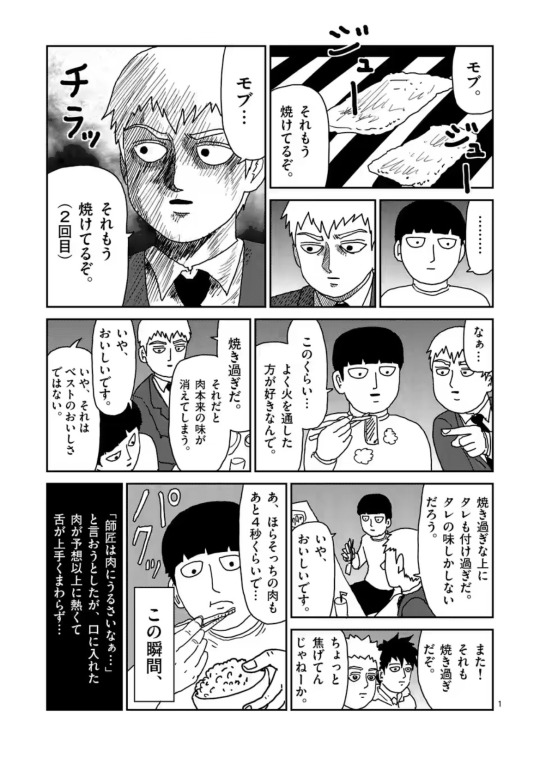
Reigen: モブ。— Mob.
それもう焼けてるぞ。— It’s about to burn!
Mob: ………
Reigen: モブ… —Mob…
それもう焼けてるぞ。(二回目) — It’s about to burn. (A second time)
なぁ… — Hey…
Mob: このくらい…よく火を通した方が好きなんで。— It’s good like this. I like the heat to spread evenly throughout.
Reigen: 焼き過ぎだ。それだと肉本来の味が消えてしまう。—It’s cooking too much. It’s going to completely lose the original flavor.
Mob: いや、おいしいです。— No, it’s tasty.
Reigen: いや、それはベストのおいしさではない。— No, that’s not the best taste.
焼き過ぎな上にタレも付け過ぎだ。タレの味しかしないだろう。— It’s overcooked and you put too much sauce on top.
Mob: いや、おいしいです。— No, it’s tasty.
Reigen: また!それも焼き過ぎだぞ。— Again! That one’s also cooking too much.
ちょっと焦げてんじゃねーか。— It’s a bit scorched, isn’t it?
あ、ほらそっちの肉もあと4秒くらいで… — Ah, look—that piece of meat, in about four seconds…
「師匠は肉にうるさいなぁ…」と言おうとしたが、口に入れた肉が予想以上に熱くて舌が上手くまわらず… — “Shishou is picky about meat, huh…” is what Mob tried to say, but when he put the meat in his mouth, it was hotter than expected and his tongue couldn’t articulate well.
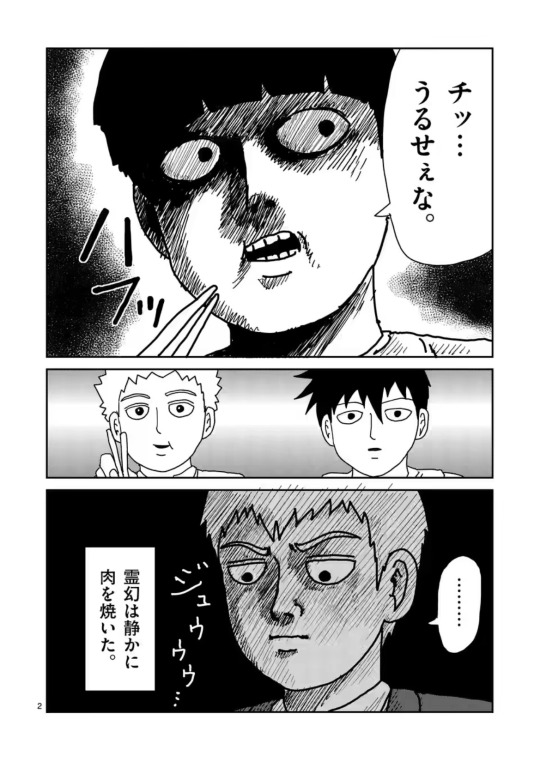
Mob: チッ… うるせぇな。— Tch… Shut the hell up.
Reigen: ………..
霊幻は静かに肉を焼いた。— Reigen cooked his meat in silence.
——————————
Notes:
- Mob: このくらい…よく火を通した方が好きなんで。— It’s good like this. I like the heat to spread evenly throughout.
「このくらい…」 actually directly translates to “This much…” (in regards to how much he’s cooking the meat over the grill). It employs the Japanese technique of “only say half the sentence and let the rest be unspoken”, but that wouldn’t make a lot of sense in English and kind of sticks out translated strictly like that. So I just finished the sentence.
- Mob: チッ… うるせぇな。— Tch… Shut the hell up.
So, this whole thing is a joke about the many uses of the word 「うるさい」 (urusai). 「うるさい 」 can be used to mean “loud/noisy”, “annoying/bothersome”, “picky/fussy/particular”, and “shut up!” when shouted as an interjection. I’ve been in a class in Tokyo where we were all yelled at for talking by our professor, who kept saying 「うるさいだよ!」. In Mob’s originally-intended sentence—「師匠は肉にうるさいなぁ…」—he was using うるさい to mean “picky/fussy”, since Reigen truly would not relax and leave him alone over that meat. But because the meat burned his mouth, he ended up clicking his tongue and slurring 「うるせぇな。」 He dropped the “Shishou” and “about meat” parts entirely, his hurt tongue not moving fast enough and holding out an “e” vowel throughout the latter half of the word instead of raising up into an “ai” sound. This… makes the word very rude. And since all other parts of the sentence were dropped, it also makes it an interjection— a rude and harsh version of “Shut up!”, which I’ve chosen to represent by making Mob curse. (Turning rude conjugation forms into English cursing is a pretty common practice in Japanese translation, as they have more expressive conjugation forms than us and we have no other real way to express that inherent hostility/brashness.)
In the most popularized English translation of this scene, the translators did something very clever to make Mob’s slurring possible, since we don’t have “rude” verb forms in English. What Mob originally wanted to say was, “Shishou sure likes to talk about meat…”, which gets slurred into “Shut up and eat.” The syllables specifically from “shishou” and “about meat” can be slurred into something phonetically resembling “shut up and eat”. I think this is extremely clever and fantastic translation work.
Anyway. Reigen deserved that.
#mp100#mp100 manga analysis#mp100 analysis#mp100 manga#mob psycho 100#shigeo kageyama#mp100 omake#mp100 translation#japanese translation#fan translation#reigen arakata
515 notes
·
View notes
Quote
日本語では一つの名前で表されるのに英語だと二種類以上あるもの
[B! 増田] 日本語では一つの名前で表されるのに英語だと二種類以上あるもの
たとえばつぎのようなもの、というお題。
亀 - Turtle (海亀)、tortoise (陸亀)
ワニ - Alligator, Crocodile
- - - - - - - - - - - - - - - -
はてなブックマークがトリビアの披露大会になっていて、知識が集まってる。
逆パターンも
「英語では一つの名前で表されるのに日本語だと二種類以上あるもの」
- - - - - - - - - - - - - - - -
日本語では一つの名前で表されるのに英語だと二種類以上あるもの
聞く:hear, listen
見る:see, look, watch
海:sea, ocean, waters, marine(海の)
仮説:hypothesis, assumption
罪:crime, sin
(「罪と罰」の罪は以外なことにcrimeのほう *)
英語では一つの名前で表されるのに日本語だと二種類以上あるもの
Museum:美術館、博物館
Requirement:要件、要求
Space:空間、宇宙
- - - - - - - - - - - - - - - -
「総称だけ存在して、細かな違いを呼び分けない」ものと、「総称は無いが、個々の細かな呼び分けだけある」ものに分けられるかも。
総称:亀 / 個々に:Turtle (海亀)、tortoise (陸亀)
総称:皿 / 個々に:dish、plate、saucer
総称:brother / 個々に:兄、弟
- - - - - - - - - - - - - - - -
秋のAutumnとFallのパターンは、意味もニュアンスも同じで、言い方が違うだけかな。
Fallが「秋」「落下」の2つの意味。
- - - - - - - - - - - - - - - -
仕事(taskとworkとjob)
槍:スピア、ランス、ジャベリン、トライデント。/悪魔:デビル、デーモン
managementもadministrationも(場合によってはcontrolも)「管理」、featureもfunctionalityも「機能」
一番有名なのはネズミ(mouse, rat)だと思ってた。他にもphantom/ghost、coast/beach、house/home、college/university、space/universe、earth/globeとか。厳密には意味が違うんだろうけど。
カラスのravenとcrow。
好き(loveとlike)/時計(clockとwatch)/サイン(sign、signatureとautograph)
言語とその話者の世界観が相関することは言語的相対論と呼ばれる。国がcountry, nation, stateに分かれるのは島国と多民族大陸国との違い。https://gijodai.jp/library/file/kiyo2011/yoshitaka_sato.pdf
ApeとMonkey
AlligatorとCrocodileの違いは、口を閉じたときに下の歯が見えるかだって伊豆で習った。
ちょっと違うが、"将来に対する希望"と、"睡眠中の幻覚体験"を日本語でも英語でも「夢 dream」という一語で表現するのは全くもってピンと来ない。
麦は日本語でも大麦・小麦・ライ麦・エン麦は区別はしてるけど、英語ではbarley wheat rye oatで「麦」に対応する単語がないのよね
アプリ開発で Apple の審査担当とやり取りする際「修正」の言い方が複数あって fix, correct, modify, revise, alter などを使い分けてくるので毎回意図を汲みとれてるか不安になる。(まあ日本語にも修正の類語いっぱいあるけど)
「毒」 poison / venom / toxin
romanceとnovel。romanceは通常騎士道物語など物語と訳されるのだけど、小説と訳されているときもある。
CollegeとUniversity
試験: 学力・知識を問う→examination,quiz,test 評価や実験→experiment 試みる→trial▼ただ「試験」で纏められるだけで日本語でも「考査」「実験」「試行」と分けて書くこともできるが。
自由(Liberty,Freedom)。契約などの法律上のやり取りが単語を増やした気もする。
紫→purple,violet
夫、旦那、亭主、主人→husband
足の指(toe)もfinger じゃない
日本語において、髭は全て「髭」で、生えてる箇所を限定する場合は「顎髭」や「頬髭」などと熟語で表現するが、英語ではそれぞれの箇所に単語がある。
リス:squirrel、chipmunk
馬車がとてもややこしくて面倒くさい / 辻馬車 cab, hansom 荷馬車 (horse)cart, wagon, (horse-drawn)carriage, horse and buggy 駅馬車 stagecoach 二輪馬車 curricle, tilbury ,jaunting car ,jinker 馬二輪戦車 chariot まだまだいっぱい…
今話題のsexとgender
政治家 politician / statesman たまご egg / spawn / roe ちなみに逆もあってegg 卵 / 玉子
この手の単語なら調理法が多い。アメリカは焼く文化だ。肉、パン、物で違う(Grill、Bread、Burn、BBQなんてのも)一方で日本は煮る文化だ。煮る、茹でる、炊く、煮込む。英語はBoil、あるいは残り全てはCookだ。
おじさんとおばさん、日本語でもこだわりがある場合には年上か年下で漢字が違うらしい。中国語では母方と父方で別の名前になる。
- - - - - - - - - - - - - - - -
知里真志保によれば、大和民族が川の始まりと考える「みなもと(源)」をアイヌ語では「川の終り」と言うのだという。つまりアイヌは川を海の方から見ているのだと。
コメントで日本語は部位に依らず「髭」だけってあるけど、いちおう漢字だと「髭(くちひげ)」と「鬚(あごひげ)」と「髯(ほおひげ)」で使い分けられる。発音はぜんぶ「ヒゲ」だけど……
- - - - - - - - - - - - - - - -
言語学で言うところの有標と無標も関係してそう。
作家:男女問わず作家の全般、女流作家:作家の中で女性の場合
標識 (言語学) - Wikipedia
英語のlionは雄雌どちらのライオンも表すが、lionessは雌だけである。前者が無標で後者が有標である。
130 notes
·
View notes
Text
双兎が来りて笛を吹く
Twin Rabbits Come and Play their Flute (Rabbit Rampage)
双子のウサギを見つけたなら
If you find a pair of twin rabbits
それを追いかけちゃいけないよ
You mustn't chase them
飛び込んだ穴の中に決して
For there's surely no Wonderland
不思議な世界は無いのだから
In the hole they've jumped down
.
神様はルールを決めたのさ
God decided on this rule
生まれ変わりゃ記憶を無くす
Where you lose your memories if you're reborn
そうしなけりゃ
If you don't
壊れだすよ
You'll start to break
.
そう パパとママのように
Yes, just like Papa and Mama
そう パパとママのように
Yes, just like Papa and Mama
.
悪魔の笛が響きだす
The demon's flute starts to play
.
親のいない子供たちだけが
Only children who have no parents
その音 聞くことができる
Can hear its sound
見定めるよ
We're sizing them up
孤独な心の
Those with lonely hearts are our
ターゲット
Target
.
君がただの子供だったなら
If you're an ordinary child
不安と記憶を失う
You'll lose your worries and your memories
もし君が僕らのあるじなら
If you're our master, then you're our
ターゲット
Target
.
ラヴィ!ラヴィ!ウサギ 来りて
Raviii! Raviii! Rabbits come
ラヴィ!ラヴィ!笛を吹くのさ
Raviii! Raviii! And play their flute
ラヴィ!ラヴ���!双子 来りて
Raviii! Raviii! Twins come
ラヴィ!ラヴィ!笛を吹くのさ
Raviii! Raviii! And play their flute
.
ひび割れたガラスの小瓶 もう道は示さない
The cracked glass bottle no longer shows the way
影のパレード その行く先は誰も知らず
No one knows where the shadow parade will go
.
E.A.T.
PARALLEL:3
CURSE AND BLESSING WORLD
.
お菓子の館を見つけたなら
If you find a candy mansion
それに魅入れられちゃいけないよ
You mustn't be drawn in
犬のコックの料理を運ぶ
For there are twin rabbits inside
双子のウサギがいるのだから
Who carry along the dog cook's meals
.
あるじは体を決めたのさ
Our master's determined to get a body
候補はいくらでも必要
She needs as many candidates as she can get
無限の旅
This endless journey
続けてゆく
Will continue
.
そう パパとママのように
Yes, just like Papa and Mama
そう パパとママのように
Yes, just like Papa and Mama
.
悪魔の笛が響きだす
The demon's flute begins to play
.
今日もレストランは盛況
Today again the restaurant's a success
ウサギは料理を運びつつ
As the rabbits carry out each dish
見定めるよ
We're sizing them up
邪悪な心の
Those with wicked hearts are our
ターゲット
Target
.
お客は食事を食べ続けて
The guests keep eating their meals
どんどん体を太らせ
And so we steadily fatten them up
弱肉強食
It's eat or be eaten
お前もいつかは
One day you too will be a
ターゲット
Target
.
ラヴィ!ラヴィ!ピエロ 来りて
Raviii! Raviii! Pierrot comes
ラヴィ!ラヴィ!笛を吹くのさ
Raviii! Raviii! And plays his flute
ラヴィ!ラヴィ!メイド 来りて
Raviii! Raviii! The maid comes
ラヴィ!ラヴィ!笛を吹くのさ
Raviii! Raviii! And plays her flute
.
この道がどこに続くか いまだにわからない
We still don't yet know where this path will lead
明けない月夜抄 辿り��けぬ僕らの家
In this Tale of an Endless Moonlit Night, we have yet to reach our home
.
笛の音色に呼びこまれて
All are enticed by the timbre of the flute
今夜も満員御礼
And so tonight as well we've got a full house
見定めるよ
We're sizing them up
素敵な食材
Superb ingredients are our
ターゲット
Target
.
灼熱地獄に包み込まれ
When they're engulfed by the scorching fires of hell
今夜の晩餐完成
Tonight's dinner is complete
焼肉定食
Our special for today is grilled meat
お前が今夜の
You are tonight's
ターゲット
Target
.
ラヴィ!ラヴィ!ウサギ 来りて
Raviii! Raviii! Rabbits come
ラヴィ!ラヴィ!笛を吹くのさ
Raviii! Raviii! And play their flute
ラヴィ!ラヴィ!双子 来りて
Raviii! Raviii! Twins come
ラヴィ!ラヴィ!笛を吹くのさ
Raviii! Raviii! And play their flute
.
ラヴィ!ラヴィ!ピエロ 来りて
Raviii! Raviii! Pierrot comes
ラヴィ!ラヴィ!笛を吹くのさ
Raviii! Raviii! And plays his flute
ラヴィ!ラヴィ!メイド 来りて
Raviii! Raviii! The maid comes
ラヴィ!ラヴィ!笛を吹くのさ
Raviii! Raviii! And plays her flute
.
起きて......ヘンゼル......
Wake up...Hänsel...
.
Evillious Chronicles
Parallel:0
Crime and Punishment World
.
気が付いた時にいたのは あの森の真ん中
When we came to, we were in the middle of that forest
置き去り月夜抄
A Tale of Abandonment on a Moonlit Night
これまでずっと夢を見てた...
We'd always dreamed of this until now...
.
...という夢を見た
...Or so we dreamed
.
CAST
アルテ・ンテ・コンチータ
Arte Ente Conchita
ポロ・二ェーゼ・コンチタ
Pollo Gnese Conchita
#()mothy#()songs#there are one or two lines i'm a little iffy on#i would like to have the full album for a little more context#nonetheless here it is#()E.A.T.
76 notes
·
View notes
Text
Translating the Human Side introductions for Witch's Heart, because I've always wanted to know what they said. If someone else has translated these without DeepL, please let me know.
[ translated with DeepL. ] [ localized by me. ] [ DeepLで翻訳 ] [ ローカライズ ]
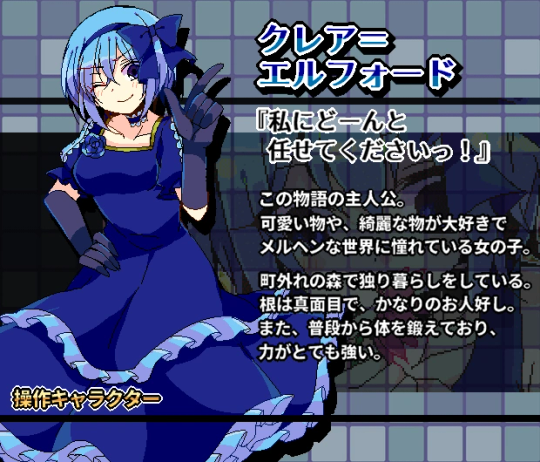
Claire Elford
"I'll take care of it!"
The main character of this story.
She loves pretty and beautiful things,
and longs to live in a fairy tale world.
She lives alone in the forest on the outskirts of town.
She is earnest at heart and quite good-natured.
She also works out on a regular basis and is extremely strong.
and I'll include the Japanese text as well, because there's no reason not to. The golden text [ 操作キャラクター ] is just [ character ].
クレア
エルフォード
『私にどーんと
任せてくださいっ!』
この物語の主人公。
可愛い物や、綺麗な物が大好きで
メルヘンな世界に憧れている女の子。
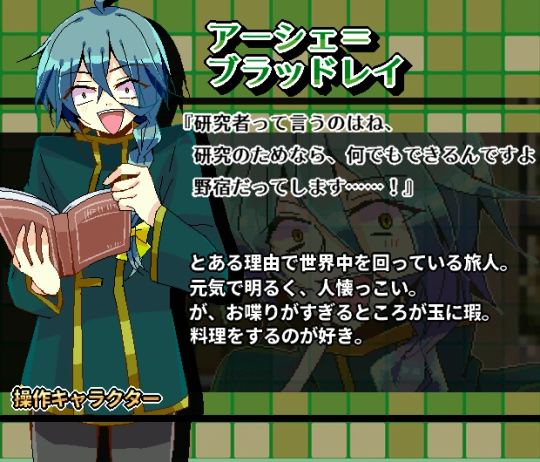
町外れの森で独り暮らしをしている。
根は真面目で、かなりのお人好し。
■また、普段から体を鍛えており、
力がとても強い。
Ashe Bradley
"You know what they say about researchers.
I can do anything for the sake of research.
I can even camp in the wild…………….!"
A man who travels around the world for one reason or another.
He is energetic, cheerful, and friendly.
However, he is a bit too talkative.
He likes to cook.
アーシェ
ブラッドレイ
『研究者って言うのはね、
研究のためなら、何でもできるんですよ
野宿だってします……………!』
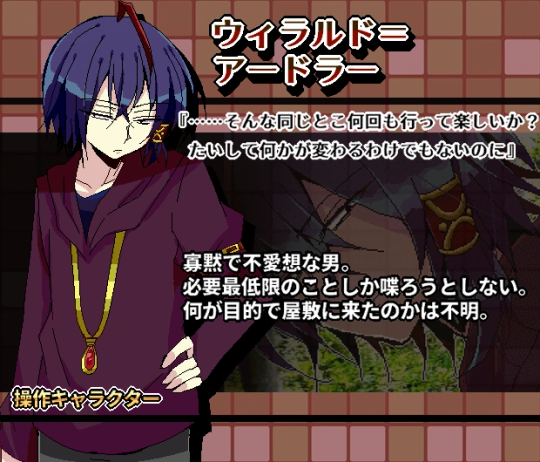
とある理由で世界中を回っている旅人。
元気で明るく、人懐っこい。
が、お喋りがすぎるところが玉に瑕。
料理をするのが好き。
Wilardo Adler
"How much fun is it to go to the same place over and over again?
It doesn't change."
A taciturn, unsociable man.
He only speaks the bare minimum.
It is unclear why he came to the mansion.
ウィラルド
アードラー
そんな同じとこ何回も行って楽しいか?
たいして何かが変わるわけでもないのに』
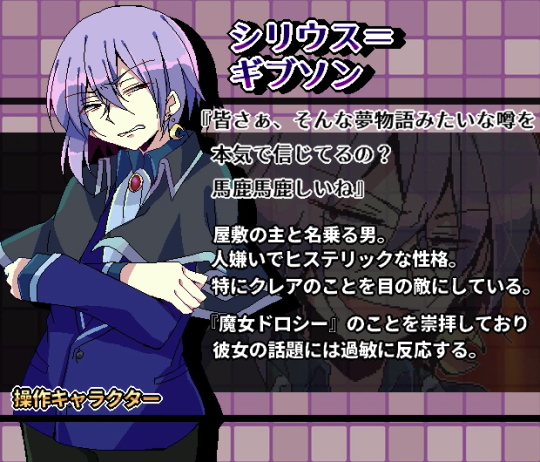
寡黙で不愛想な男。
必要最低限のことしか喋ろうとしない。
何が目的で屋敷に来たのかは不明。
Sirius Gibson
"Do you people really believe those fantastical rumors?
They're absolutely ridiculous."
A man who claims to be the owner of the mansion.
He is misanthropic and hysterical.
He is especially hostile to Claire.
He reveres "The Witch Dorothy",
and is sensitive to any mention of her.
シリウス
ギブソン
『皆さぁ、そんな夢物語みたいな噂を
本気で信じてるの?
馬鹿馬鹿しいね』
屋敷の主と名乗る男。
人嫌いでヒステリックな性格。
特にクレアのことを目の敵にしている。
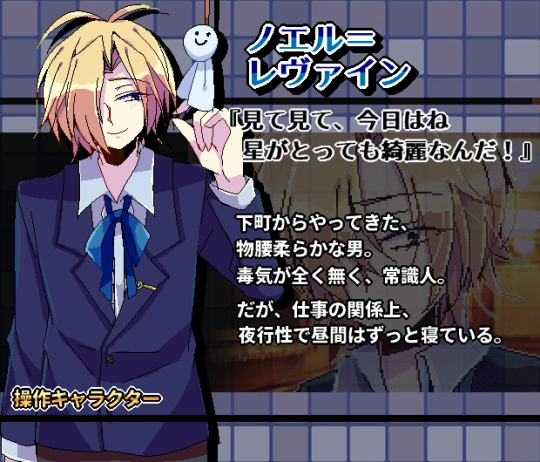
『魔女ドロシー』のことを崇拝しており
彼女の話題には過敏に反応する。
Noel Levine
"Look, look.
The stars are so beautiful tonight!"
A soft-spoken man from downtown.
He is a sensible man with no venom in his voice.
However, due to his work, he is nocturnal and sleeps all day long.
ノエル
レヴァイン
「見て見て、今日はね
星がとっても綺麗なんだ!』
[ Obsessed with Noel being from downtown... And Sirius' hysteria ]
下町からやってきた、
物腰柔らかな男。
毒気が全く無く、常識人。
だが、仕事の関係上、
夜行性で昼間はずっと寝ている。
#witchs heart#witch's heart#claire elford#ashe bradley#wilardo adler#sirius gibson#noel levine#illym translation
20 notes
·
View notes
Text
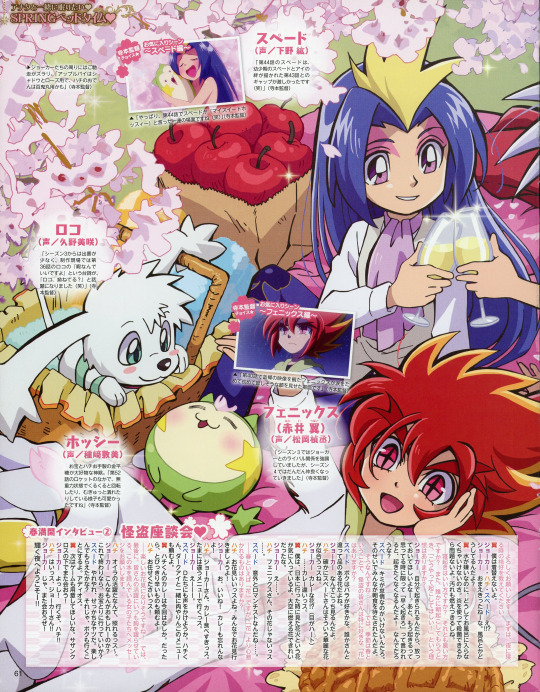

Otomedia Plus + SPRING 2017
(Below is a cleaned up machine translation. Please note that due to the nature of machine translation, the text may not be wholly accurate or may read oddly. Japanese is included after English for reference. The text was lifted from the images using this site, and though there's been care taken to make sure everything is correct, there is a chance of unintentional typos.)
I want to sleep together with you ♡
Spring Bedtime
アナタと一緒に眠りたい♡
SPRING ベッドタイム
~
Character Bio
Joker
(Voice: Ayumu Murase)
By making Joker frustrated with Hosshi, we got to see the Joker's funny, impatient faces in Season 3-4. (Director Teramoto)
ジョーカー
(声/村瀬歩)
「ジョーカーにホッシーへ の苦手意識を持たせたこと で、シーズン3.4ではジ ョーカーの焦った面白い顔 が見れました」(寺本監督)
Hachi
(Voice: Yumiko Kobayashi)
Hachi is now "Hachi the Phantom Thief Apprentice" and is on the same advance notice as Joker, but one day we may be able to call him "Hachi the Phantom Thief". (Director Teramoto)
ハチ
(声/小林由美子)
「今は“怪盗見習いハチ” でジョーカーと一緒の予告 状ですが、 いつか “怪盗ハ チ” と言える日が来るかも しれませんね」 (寺本監督)
Spade
(Voice: Hiro Shimono)
In episode 44, Spade's bond with Ai alongside Spade's childhood was depicted, and the gap between episode 43 and 44 is quite drastic (laughs). (Director Teramoto)
スペード
(声/下野紘)
「第44話のスペードは、 幼少期のスペードとアイの 絆が描かれた第43話との ギャップが激しかったです (笑)」 (寺本監督)
Phoenix
(Voice: Yoshitsugu Matsuoka)
In Season 3, the rivalry between Phoenix and Joker was emphasized, but in Season 4, the two became gradually closer.
フェニックス
(赤井翼) (声/松岡禎丞)
「シーズン3ではジョーカ ーとのライバル関係を強調 していましたが、シーズン 4ではだんだん仲良くなっていきました」 (寺本監督)
Hosshi
(Voice: Atsumi Tanezaki)
Hosshi is a divine beast that loves treasures and Hachi's homemade kompeito. In the rocket in episode 52, the way it spins around and squishes in a gravity-free state was also very cute.
ホッシー (声種崎敦美)
お宝とハチお手製の金平 糖が大好物な神獣。 「第52 話のロケットのなかで、無 重力状態でくるくると回転 したり、むぎゅっと潰れた りしている様子も可愛かっ たですね」 (寺本監督)
Roko
(Voice / Misaki Kuno)
Since season 3 he's had few appearances so at the production site Roko’s line in episode 36, "I'm free so it's okay" became a hot topic, "'Roko, are you sulking?' (laughs)" (Director Teramoto)
ロコ
(声/ 久野美咲)
「シーズン3からは出番が少なく、 制作現場では第 36話のロコの『暇なんで いいですよ』 という台詞が、 『ロコ、拗ねてる?」 と話 題になりました(笑)」(寺本監督)
~
Main
(Top left note) Joker and friends are surrounded by tasty food. The apple pie is for Shadow and Rose, and Hachi's oden is probably for Hyakkimaru (Director Teramoto)
ジョーカーたちの周りにはご馳 走がズラリ。 「アップルパイはシ ャドウとローズ用で、ハチのおでんは百鬼丸用かも」 (寺本監督)
Joker and company have finished their adventures in Season 4 so now we're here. It's Japan in Spring, where the cherry blossoms are in full bloom! It seems that everyone is enjoying Hanami (cherry blossom viewing) while feasting on Hachi's cooking. I wonder what kind of festivities they have in store, Director Yukiyo Teramoto!
"March 13th is Spade's birthday and April 13th is President D's birthday, so this could be a celebration for them as well. The apples may have been a gift from D."
I want to keep watching the peaceful atmosphere of the phantom thieves, but they must be waiting for the next treasure!! Until we see Joker and his friends again, 'smile and au revoir'!
シーズン4での冒険を終えたジョーカーご一行が、本日やって来た場所。それは、桜咲く春の日本! ハチの料理に舌鼓を打ちつつ、みんなでお花見をしているようです。一体どんなお祭り騒ぎになっているんでしょうね、寺本幸代監督! 「3月13日がスペードの誕生日、4月13 日がプレジデントDの誕生日なので、 ふたりのお祝いも兼ねているのかもしれま せんね。ほかのみんなも続々と集まって きて、りんごはDからの差し入れかも」 穏やかな雰囲気の怪盗たちをずっと見 ていたいけど、彼らには次なるお宝が待 っているハズ!! またジョーカーたちに 会える日まで、笑顔でオ・ルボワール!
Spring Blossom Interview with Director Yukiyo Teramoto
春満開インタビュー 寺本幸代監督
Please tell us about the secret story behind the production of the final episode.
最終話の制作秘話を教えてください。
Finishing and shooting lasted all night for about three days, and it seems that I could see hallucinations by the end of it (laughs). I am relieved that we were able to broadcast the content that we were able to show. The trick that the passcode to unlock the missile is "HEART" was thought up by Naohiro Fukushima, in charge of screenwriting. I think the highlight was the scene where Joker writes his name on the spaceship and tells Phoenix, "Be sure to come back." I wonder when he wrote the name, but in the shot of the spaceship just before this scene, the name is obscured by light to disguise it. So the name was already written at that point.
最後は仕上げと撮影が3日間くらい徹夜して、 幻が見えたそうです(笑)。なんとかお見せでき る内容で放送することができて、ほっとしまし た。ミサイルの解除パスコードが 「HEART」 というトリックは、脚本の福島(直浩)さんが考 えてくれました。 ジョーカー的には宇宙船に名前 を書いて「必ず返しに来い」とフェニックスに言 うシーンが、見せどころだったと思います。いつ の間に名前を書いたのかと思いますが、そのシー ンに入る直前の宇宙船が映るカットでは名前を誤 魔化すために光を入れて見えなくしています。な ので、あの時点ではすでに書いてあるんですよ。
What was the most memorable moment for you other than the last episode?
最終話以外で、印象的だったことは?
There is a scene in the end of episode 50 where Spider Ace protects President D from a sniper's bullet and shows him the "DF" ring on his left hand, saying, "I have sworn my allegiance to President D." When the first picture came in, the ring on Spider Ace's middle finger was forgotten, so I asked for the picture to be redone and a ring to be added. Then somehow, I ended up with a picture of Spider Ace with the ring on his ring finger (laughs). The staff around me and I laughed hysterically and rushed to have it fixed.
第50話のラストでスナイパー幻魔の銃弾からプ レジデントDをかばったスパイダー・Aが、「オ レはプレジデントDに忠誠を誓ったんだ」と左手 の《DF》の指輪を見せる場面があります。最初 に絵が上がって来たときスパイダーAの中指に 指輪を描き忘れていたので、リテイクで指輪を追 加してもらったんですよ。そうしたらなぜか、ス パイダーAの薬指に指輪がはまった絵が上がっ て来てしまって(笑)。周りのスタッフたちと大 爆笑しつつ、慌てて直していただきました。
By the way, In this issue, we are looking into the sleeping habits of Joker and his friends! Who among them do you think is the best at getting up early?
ちなみに今号では、ジョーカーたちの睡眠事 情に迫っております! 彼らのなかで、早起きが 得意そうな人物は誰だと思いますか?
Hachi has to prepare food, so I think he wakes up early. It seems that Hyakkimaru is also living a proper life. It seems that Spider Ace, who is in a pumped up state after drinking coffee, will wake up early, but I feel that he will be weak in the morning if he hasn't.
ハチはご飯の支度があるので、早起きだと思い ます。百鬼丸もきっちり生活していそうですよ ね。コーヒーを飲んでヒャッハー状態のスパイダ Aも早起きそうですが、コーヒーを飲んでい ないヘタレ状態だと朝が弱そうな気がします。
Is there a character you would have liked to explore more?
では、もっと掘り下げて描いてみたかったキ ャラクターはいらっしゃいますか?
I wanted to depict how Spider Ace came to be loyal to D. I liked Spider Ace and Detective Wolfe in the original story, and I really wanted to have Detective Wolfe appear in episode 35, but there was no room for him, so I gave up on the idea. I am glad that I was able to create an interesting combination with D and Spider Ace, but I also wish I could have drawn those two in the story. With Dai Sato, who is in charge of the series composition, I was also thinking about a story about Dr. Neo's astronaut days. When he was young, he had a moment when he saw a spaceship that was disguised as a comet for a moment due to the influence of a solar flare, and from that moment he came to believe that aliens existed. It was a shame that we couldn't depict it. Neo knew Silver when he was young, and I wanted to depict that with Purple as well.
スパイダーAがDに忠誠を誓ったキッカケを 描きたかったです。 スパイダー・Aは原作でのウ ルフ刑事とのコンビが好きだったので、本当は第 35話でウルフ刑事も登場させたかったのですが、 入る隙間がなくて諦めました。そのおかげでDと スパイダー・Aという面白いコンビが出来たので よかったという思いもありますが、あのふたりも 描きたかったという気持ちもあります。シリーズ 構成の佐藤 大さんとは、ドクター・ネオの宇宙 飛行士時代のお話も考えていました。若かりしネ オが太陽フレアの影響で一瞬だけ彗星の変装が解 けた宇宙船を見た瞬間があり、そこから宇宙人は いると信じるようになったという設定だったのですが、これも描けなくてもったいなかったです。 ネオは若い頃のシルバーとも顔見知りなので、パプルも交えてその辺りを描きたかったですね。
Finally, please tell us what "Kaitou Joker" means to you, Director Teramoto.
最後に、寺本監督にとって『怪盗ジョーカとは、どんな存在なのかを教えてください。
For me, it is a special work that fulfilled my dream of directing an animated TV series. I myself have loved anime since I was a child, and even now as an adult, there are many works that I still remember as my favorites. There are still many stories I would like to tell from the original work, and if there is an opportunity, I would love to do a sequel. The staff also said that they would like to do a sequel, so I feel that "Kaitou Joker" is a work that is truly loved by everyone.
私にとっては、TVアニメの監督をやりたいと いう夢が叶った特別な作品です。私自身も小さい 頃からアニメが好きで、大人になった今も好きだ ったと思える作品がたくさんありますが、アニメ 『怪盗ジョーカー』を観てくれた子どもたちも大き くなり、いつかジョーカーたちを思い出すことが あるのかなと思うと、すごく感慨深いです。 まだ 原作でもやりたいお話がたくさんありますし、機 会があったら続編もぜひやりたいですね。スタッ フも「続編がやりたい」と言ってくださっている ので、『怪盗ジョーカー』は本当にみんなに愛され ている作品だと感じています。
Spring Blossom Interview 2: The Phantom Thief Roundtable Discussion
春満開インタビュー2 怪盗座談会
Nice to meet you! To start off, what do you dress in at bedtime?
よろしくお願いします! まずは、夜に寝る時の格好を教えてください
Tsubasa: I don't change my clothes.
翼 「僕は着替えないよ。」
Joker, Hachi, Spade: Huh!?
ジョーカー・ハチ・スペード 「え!!!」
Joker: That's so dirty. Do you even take baths?
ジョーカー 「おまえきったねーな。風呂とかどうしてるんだよ?」
Tsubasa: Why should I take a bath if I don't like water? You can use flames to sterilize, so there's no problem. Even the dirt burns off.
翼 「水が嫌いなのに、どうしてお風呂に入らなくちゃいけないのさ。炎を使って殺菌できるか ら問題ないよ。汚れも燃えつきるしね。」
Are you a good sleeper or a bad sleeper? Also, when you ask someone to wake you up in the morning, do you have a vision of how you want them to wake you up?
寝起きはいい方ですか? それとも悪い方 ですか? また、誰かに朝起こしてもらうと き、「こうやって起こしてほしい!」という理 想はありますか?
Joker: I can wake up on my own, so I wish people would stop pestering me. Also, when I'm ready to get up and someone tells me to hurry it up, I don't want to get up! I wonder why?
ジョーカー 「自分で起きられるんだから、放っ ておいてほしいよなー。あと、もう起きるって 思ってる時に限って「���く起きろ」って言われ ���と、起きたくなくなるんだよ! なんでだろ うな?」
Spade: It's not good to so lazy. Because of that, everyone had to wait for breakfast.
スペード 「キミが怠惰なのがいけないんだろ。そのせいでみんなが朝食を待たされたんだよ。」
I see... So, since the season is Spring, do you phantom thieves have a particular favorite flower?
そうなんですね・・・・・・では、季節は春ということで、怪盗の皆さんは特に好きな「花」 はありますか?
Spade: I like roses. Unlike some people, I think roses are elegant flowers.
スペード 「ボクはバラが好きかな。誰かさんと 違って品のある花だよね。」
Joker: Why are you looking at me?
ジョーカー「なんでこっち見るんだよ。」
Hachi: Certainly, such gorgeous* flowers suit you, Spade-san.
ハチ「確かにスペードさんはそういう華麗な花が似合うっスね。」
Joker:A 'curry' flower!? (Heart eyes)
ジョーカー「カレーな花?!?(目がハート)」
Hachi: Not 'curry'.
ハチ「カレー違いっス。」
*Gorgeous (華麗), pronounced 'karei', which sounds similar to 'カレー' (karee, curry). The joke lost in translation is that Hachi has said a gorgeous flower, and Joker hears 'curry' because the word sounds similar.
Tsubasa: I like the flower called Hanabi that I saw when I went to Japan. It was a beautiful flower burning in the sky.
翼「僕は、日本に行った時に見た花火という花が気に入っているよ。 大空に燃える花できれい だったな。」
Joker:Huh......
ジョーカー「え······。」
Hachi: Phoenix-san, that isn't a flower.
ハチ「フェニックスさん、その花じゃないっス」
Spade: You're unexpectedly romantic....
スペード「意外とロマンチストなんだね・・・・・・。」
Spring is all about flowers, but is there anything that attracts you more than flowers?
春といえば「花」ですが、「花」より心惹 かれるものはありますか?
Hachi: Cherry blossom viewing is great, isn't it? Let's all go to hanami together!
ハチ「お花見いいっスよね。みんなでお花見行 きましょうよ!」
Joker: Oh, nice! Don't forget the curry!
ジョーカー「お、いいね! カレーも忘れんな よ!」
Hachi: Joker-san, you eat too much curry. I'd like a different menu once in a while.
ハチ「ジョーカーさん、カレー食べすぎっス。たまには違うメニューで行くっス。」
Joker: Ehhh......
ジョーカー「えー――。」
Spade: I'll ask D and the others to join us. Hachi, Dark Eye and I would like to request to have meat and apples on the menu.
スペード「Dたちにも声をかけようか。ハチく ん、ダークアイと一緒に肉やりんごのメニュー も頼むよ。」
Tsubasa: No curry from Hachi this time? In that case, I'll request something extra spicy!
翼「ハチくんのカレーは今回はなしか。だったら、とびっきり辛いものも頼むよ!」
Hachi: Leave it to me!
ハチ「お任せくださいっス!」
It's going to be a fun hanami! Lastly, please give a message to the girls reading this book, who are always excited to read about your great activities.
楽しいお花見になりそうですね!では、最後に。皆さんの活躍にいつも胸を躍らせてい る、この本を読んでいる女の子たちへメッセー ジをお願いします。
Hachi: It's a little embarrassing to hear that I'm doing so well~
ハチ「オイラの活躍だなんて、照れるっス~。」
Joker: Is this really that interesting? If this is the end, can I go find a treasure?
ジョーカー「こんなもんがおもしれーのか? これで終わりなら、お宝とりに行っていいか?」
Spade: Yeesh, he's so impatient. I hope you've had fun. Well, I'll be on my way, too. Adios.
スペード「やれやれ、せっかちなヤツだ。楽しんでもらえたかな? それじゃ、ボクも行くこ とにするよ。アディオス。」
Tsubasa: I hope there's games next time. See you under the Southern Cross!
翼「次はゲームも用意してほしいな。サザンクロスの下でまた会おう!」
Joker: Alright! Let's go, Hachi!!!
ジョーカー「よっし!行くぞ、 ハチ!!!」
Hachi: Yes, Joker-san!!
ハチ「はいっス、ジョーカーさん!!」
Joker: See you next time! Welcome to the Shining Night!!
ジョーカー「じゃ、また会おうぜ!輝く夜へようこそー!!」
27 notes
·
View notes
Text


今日のお弁当は、ヤンニョムチキン弁当!
ほうれん草の胡麻和えと卵焼き、ブロッコリーも添えて。あいにく曇りで写真があんまり綺麗に撮れなくて残念だけど。🥺 味は美味しいはず!😋
Today’s lunch box is sweet and spicy Korean fried chicken with omelet, sesame spinach and broccoli.
It’s cloudy today so the photos didn’t come out so well 😢 but I believe it tastes good! 😋
——————————————————————————
次回の動画はズバリ、ヤンニョムチキンです!興味のある方は是非見てって下さい。めちゃくちゃ美味しくできました!毎週新しい動画あげているのでチャンネル登録宜しくお願いします😊
My next video will be Sweet and spicy Korean fried chicken! Check it out if you want to know how to make them🍗 Feel free to subscribe and stay updated for my new delicious videos!
98 notes
·
View notes
Photo

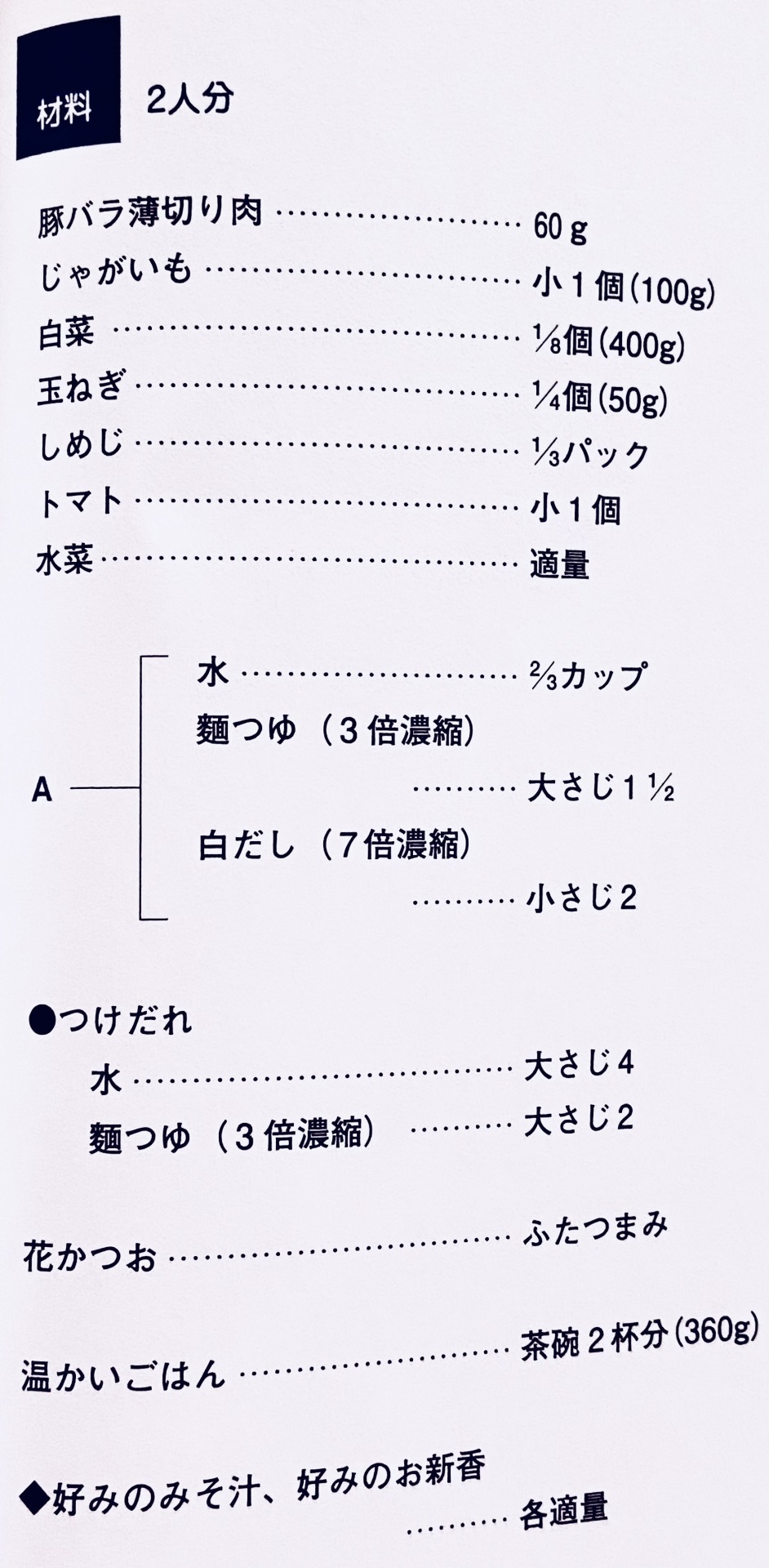
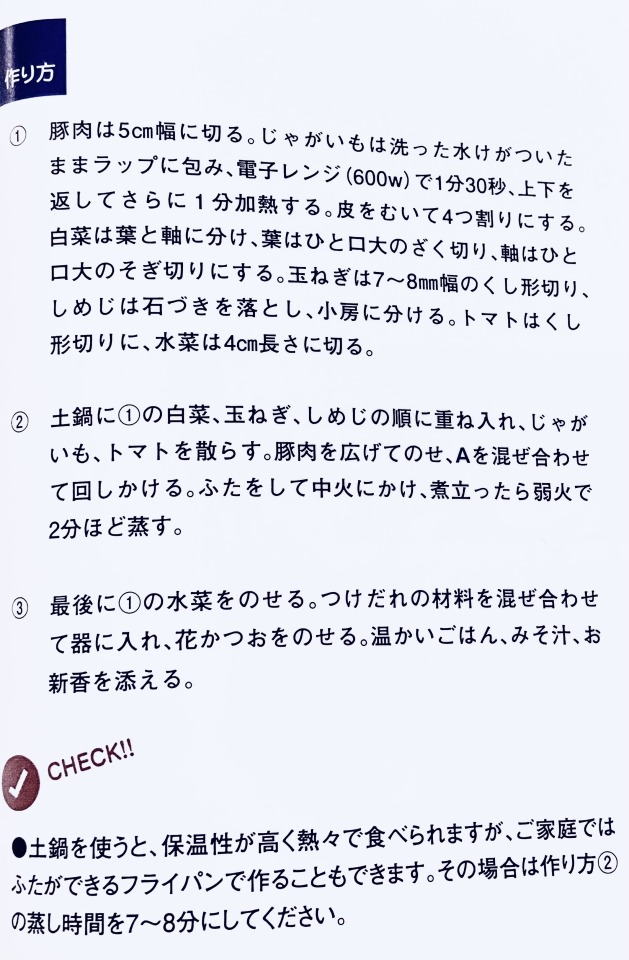
✿ 豚とたっぷり野菜の蒸し鍋定食
#cook:豚しゃぶ肉#cook:豚肉#cook:鍋物#本:大戸屋 にっぽんの定食レシピ#cook:主菜#cook:白だし×めんつゆ#cook#cook:2020〜#cook:じゃがいも#cook:はくさい#cook:豚ばら薄切り肉#cook:トマト#cook:みずな
0 notes
Photo
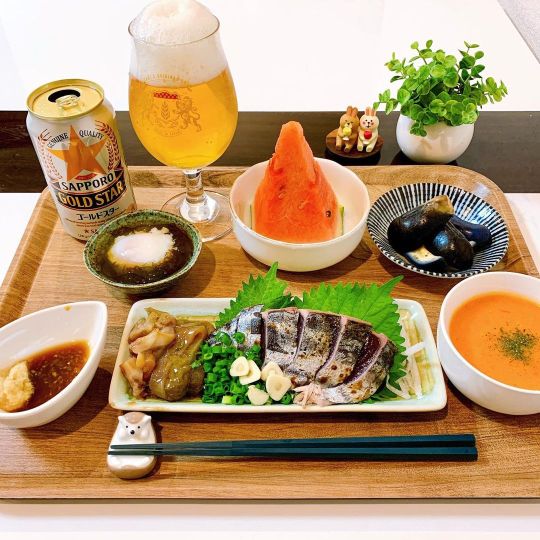
𖠿𖥧𖥣。𖠿 .゜ 今日の晩ごはん!今夜はオール旦那はん作! 鰹のタタキが特売してたから買ってみたけど ニンニク生姜醤油で食べてとても美味かた😍 庭のトマトと胡瓜が出来すぎて消費が 追いつかんのやが旦那がスープにした! これもまたニンニクが効いてて酸味がサッパリ 美味しかった☺️小茄子の漬物はお婆ちゃん作🍆 #鰹のタタキ #烏賊の沖漬け #トマトと胡瓜のガスパチョ #もずく温泉玉子 #お婆ちゃんが漬けた茄子浅漬け #スイカ #サッポロゴールドスター #家呑み #おうち居酒屋 #おうちごはん #おうちごはん部 #おうちごはんlover #今日の晩ごはん #TodaysDinner #晩ごはん記録 #献立記録 #てづくりごはん #てづくりごはん365 #cooking #cook365 #タベリー #フーディーテーブル #クッキングラム #キッチングラム #夫婦ごはん #ふたりごはん #豊かな食卓 #cyuley作ディナー #cyuley 今日は久しぶりにピーカンで暑くてエアコン フル稼働🥵ウサギも庭にも出たがらへん😂😂😂 なう(2022/07/25 20:45:50) https://www.instagram.com/p/CgbyEYFvs_U/?igshid=NGJjMDIxMWI=
#鰹のタタキ#烏賊の沖漬け#トマトと胡瓜のガスパチョ#もずく温泉玉子#お婆ちゃんが漬けた茄子浅漬け#スイカ#サッポロゴールドスター#家呑み#おうち居酒屋#おうちごはん#おうちごはん部#おうちごはんlover#今日の晩ごはん#todaysdinner#晩ごはん記録#献立記録#てづくりごはん#てづくりごはん365#cooking#cook365#タベリー#フーディーテーブル#クッキングラム#キッチングラム#夫婦ごはん#ふたりごはん#豊かな食卓#cyuley作ディナー#cyuley
1 note
·
View note
Text
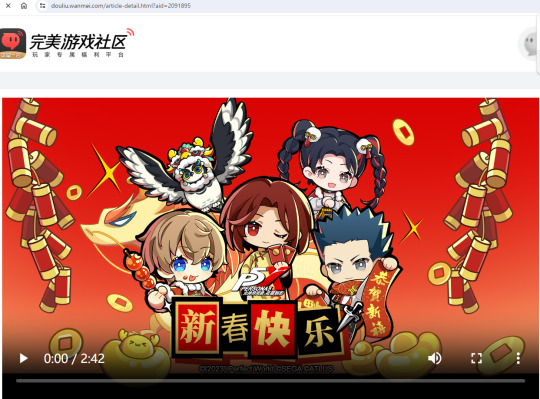
Chinese New Year Commemorative Greeting Video by Chinese Dubbing Voice Actors
Protagonist / Wonder:
Thank you for your help last year.
Hello, everyone.
I am Su Shanqing, the Chinese voice actor of Wonder, the main character of P5X.
It's almost Chinese New Year.
I would like to wish you a Happy New Year and all the best.
Ruferu / Cattle:
Ho-ho! I've been waiting for you.
Good day to you all, leader of the Phantom Thieves.
I am your guide to another world. ----
This is Hong Haitian, the Chinese voice actor of Rufel.
It will soon be New Year's Day.
I hope all the leaders can spend their days in good health and joy in the New Year.
I look forward to seeing you again in the world of P5X.
Then I will guide you then, ho-ho-ho!
Lee Yaoling / Rin:
"The sound of firecrackers heralds the end of the year, and the spring breeze brings warmth to the tussu wine."
*This is a quote from the poem "New Year's Day" by Wang Anshi, a poet in the Song Dynasty.
New Year's Day! New Year's Day!!! I can't wait to go home…
Hmmm… I think Lee Yaoling actually thinks this too.
Hello everyone,
I am a fellow thief leader and a Chinese exchange student;
Li Yaolin's Chinese voice actor, Xiao Lian Xiao!
It's almost the New Year and I would like to take this opportunity to wish all of you "teachers" a very Happy New Year!
Let's go home soon and see each other again.
Eh? As to why he (Wonder?) is a teacher…
Now let's wait for P5X to release the rest!
Motoha Arai / Closer:
(Stretching…  ̄▽ ̄
What? "It's your turn"…?
How are you doing lately?
There may be some difficulties, but don't panic, let's stay positive!
Hello, leaders of the Phantom Thieves! I am one of you leaders' fellow,
I am Zhu Quecheng, the Chinese voice actress of Motoha Arai.
A new year is about to begin.
A red-hot, blazing, lively New Year is coming!
I wish all the leaders happiness and laughter every day.
Shun Kanou / Soy:
Hey, is there anything you want to eat today?
It's a special occasion, let me handle the cooking.
Hello, thief leader. I am Liu Yuxuan, the Chinese voice actor of Shun Kanou.
It's almost the Chinese New Year.
I hope all of you leaders will eat well and sleep well to welcome the New Year.
I am waiting to see you all in the world of P5X!
◆主人公(ワンダー)
【日本語訳】
昨年はお世話になりました。
こんにちは、みなさん。
私はP5Xの主人公ワンダーの中国語声優、スー・シャンチン(苏尚卿)です。
もうすぐ旧正月ですね。
新年あけましておめでとうございます、そしてご多幸をお祈り申し上げます。
【中国語の原文】
去年承蒙关照
Hello 各位好
我是P5X主人公Wonder的中文配音演员苏尚卿
临近农历新年
在此恭祝各位新年快乐,万事如意
◆ルフェル
【日本語訳】
ホホー!ずっと待っていたぞ。
皆の者御機嫌よう、怪盗団リーダー。(※プレイヤーの事)
ワシはお前の異世界への案内人だ————
ルフェルの中国語声優の洪海天です。
もうすぐ元旦になりますね。
新年もリーダーの皆様が元気で楽しく毎日を過ごせることを願っています。
P5X の世界でまたお会いでき��ことを楽しみにしています。
ではその時はワシが案内しよう、ホッホゥ!!
【中国語の原文】
嚯嚯,吾已经等你好久了
各位队长大家好
我是各位的异世界向导———
路菲尔的中文声优洪海天
马上就到新年啦
希望各位队长新的一年健康、幸福、天天开心
期待我们早日在P5X的世界中相见哦
届时吾会指引你的,嚯嚯
◆李瑶铃(リー・ヤオリン)
【日本語訳】
「爆竹の音が年末を告げ、春風がトゥス酒に暖かさをもたらします」
※宋の時代の詩人、王安石の詩「元日」の引用。
お正月~お正月~早く帰りたいですね…
ふふふ、李瑶铃(リー・ヤオリン)も実はこう思ってそうですね。
みなさんこんにちは、
私は怪盗団リーダー皆さんの仲間の中国人留学生、
李瑶铃(リー・ヤオリン)の中国語声優の小连杀で~す!
もうすぐ新年ですね、この場を借りて「先生」の皆様のご多幸をお祈り申し上げます。
早く帰って、再会しましょう。
え? なぜ彼(ワンダーの事?)が教師なのかというと…
あとはP5Xで公開されるのを待ちましょう!
【中国語の原文】
爆竹声中一岁除,春风送暖入屠苏
新年新年,好想回家啊……
哈哈哈,这应该是李瑶铃的心里话吧
各位好
我是P5X中的各位队长的中国留学生朋友
李瑶铃的中文声优小连杀~
新春将至,我借此机会祝愿各位“老师”们
早早回家,团团圆圆
嗯?至于为什么是老师呀……
那就等着在P5X里再揭晓咯
◆新井素羽
【日本語訳】
(ストレッチ中…  ̄▽ ̄
え?「あなたの番だよ」?
最近調子はどう?
大変なことがあるかもしれないけど慌てないで、前向きにいこう!
怪盗団のリーダーたちこんにちは!私はリーダーたちの仲間、
新井素羽の中国語声優の朱雀橙です。
新しい年がもうすぐ始まりますね。
赤々と燃えるような賑やかな新年がやってきます!
私は、すべてのリーダーが毎日幸せで、笑いが絶えない��とを願っています。
【中国語の原文】
(伸懒腰中……  ̄▽ ̄
嗯?是你啊…….
最近过得怎么样
遇到麻烦别苦恼,开心一点嘛
队长好!我是各位队长的队友、好兄弟
新井素羽的中文声优朱雀橙
新的一年马上就要到啦
在这红红火火的新春即将到来之际
我,在此祝愿各位队长天天开心,笑不离口
◆加納駿
【日本語訳】
なあ、今日何か食べたいもんはあるか?
特別な日だからな、料理なら俺に任せてくれ。
こんにちは、怪盗団のリーダー、私は加納駿の中国語声優の刘雨轩です。
もうすぐ春節ですね。
リーダーの皆さんには、よく食べてよく眠って新年を迎えていただきたいと思います。
P5Xの世界で皆さんにお会いできるのを待っています!
【中国語の原文】
哟,今天有没有什么想吃的
特别的日子嘛,反正没事,让我来下厨吧
Hello 队长好,我是加纳骏的中文声优刘雨轩
新春佳节即将到来
在此希望各位队长新年里吃的饱饱,睡的好好
我会在P5X的世界里等着和各位见面哦
15 notes
·
View notes
Text
BNHA 387 Japanese to English Translation + Commentary

火叢は血が濃いんだ
ひむらはちがこいんだ
= “Himura blood is thick.”
Tagline 1:
No.387 煮凝り
ナンバー387 にこごり
= No. 387 Nikogori
煮凝り (romaji: nikogori) is a traditional Japanese jellied broth made by boiling meat or fish bones, scales, heads, and tails to extract a savory nutrient-dense jelly that is then cooled and solidifies due to its high gelatin content. Other gelatins are sometimes added to the mix. After cooling and solidifying, the nikogori jelly is typically used to encase or accent other foods. Unagi nikogori, pictured below, is a dish of eel encased in fish gelatin, for example:
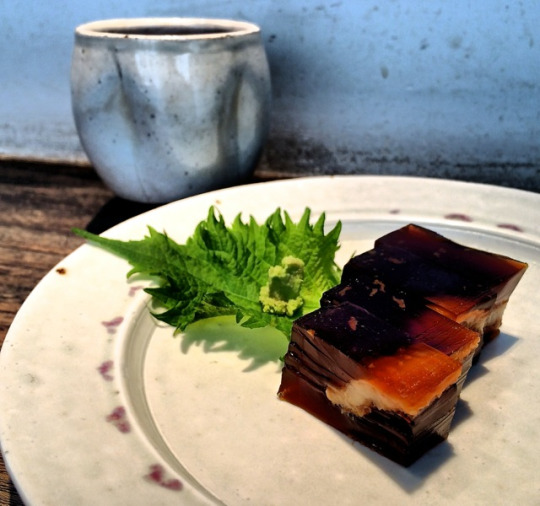
Nikogori is written using two kanji: 煮 (= “burn; boil; cook”) and 凝 (= “freeze; congeal”). In No.351, Touya mocks Shouto by comparing him to the jellied broth, making a pun of the kanji for nikogori and the kanji for Shouto’s name, both of which translate to “burn” + “freeze.” But Shouto doesn’t appear in this chapter, so who, if not him, does the title, Nikogori, refer to? Touya, the other fire + ice broth-er.
Tagline 2:
語るは…
かたるは…
= The speaker…
古くからの庄屋だった火叢は農地改革後も分家を増やす事で財とプライドをなんとか保ってきた
ふるくからのしょうやだったひむらはのうちかいかくごもぶんけをふやすことでざいとプライドをなんとかたもってきた
= “The Himuras, who were village leaders in times of old, managed to preserve their fortune and pride even after [Japanese] agrarian reform by adding branch families.”
Here’s a very, very brief excerpt from a published journal article about the subject:

Japanese agrarian reform “gave land to the landless.” This monumental redistribution of land and associated resources came at a great cost to village heads, called “landlords” by the author, whose power and influence decreased significantly in the years that followed. The Himuras tackled the problems of ongoing land and monetary losses by increasing their numbers through the establishment of branch families (i.e., more members = more opportunities to accumulate wealth for the family and maintain some semblance of their former status).
Tagline 3:
超常解放戦線幹部
ちょうじょうかいほうせんせんかんぶ
= Paranormal Liberation Front Officer
Tagline 4:
外典 個性「氷操」
げてん こせい「ひょうそう」
= Geten, Quirk: “Ice Manipulation”
でも超常が起きると共に加速度的に零落していった
でもちょうじょうがおきるとともにかそくどてきにれいらくしていった
= “Nevertheless, the advent of the paranormal hastened their ruin.”
血が混ざるのを嫌ったんだ
ちがまざるのをきらったんだ
= “They hated mixing blood.”
お家柄と…異形差別のコンボね スピナーが聞いたらなんて言うかな
おいえがらと…いぎょうさべつのコンボね スピナーがきいたらなんていうかな
= “A combination of pedigree and… igyou* discrimination. What would Spinner say if he heard this?”
異形 (romaji: igyou) is the word commonly translated as “heteromorph,” and indeed, it can mean “atypical appearance; atypicality; heteromorphy.” There are two potential hiragana forms for 異形. The first, いぎょう, corresponds to the dictionary meaning “fantastic; grotesque; strange-looking; suspicious-looking” and is the word used by everyone in-series to refer to this class of people.

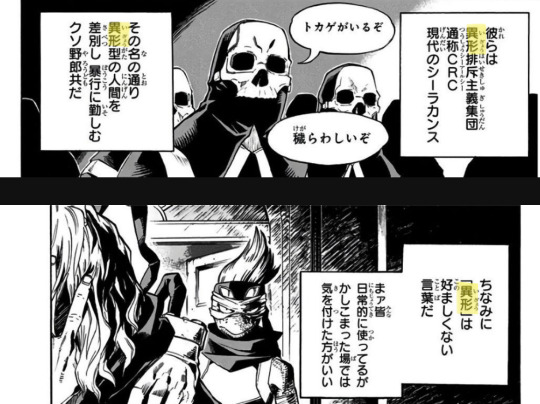


The second, いけい, corresponds to the dictionary meaning “atypical appearance; atypicality; heteromorphy.” Characters like Spinner and Shouji belong to a class of people literally called “grotesque [people].” Caleb’s choice to translate igyou as “heteromorph” understates the violence and prejudice built into the word itself. Functionally, igyou is a racial slur that stereotypes an entire subpopulation as socially undesirable, untrustworthy, and criminal, even monstrous. But if we are to believe that Mr. Compress cares about Spinner as his friend, why does he use it? Because, as Spinner notes in No.220, no one can agree on an alternative word that isn’t offensive.
Tagline 5:
Mr.コンプレス
ミスターコンプレス
= Mr. Compress
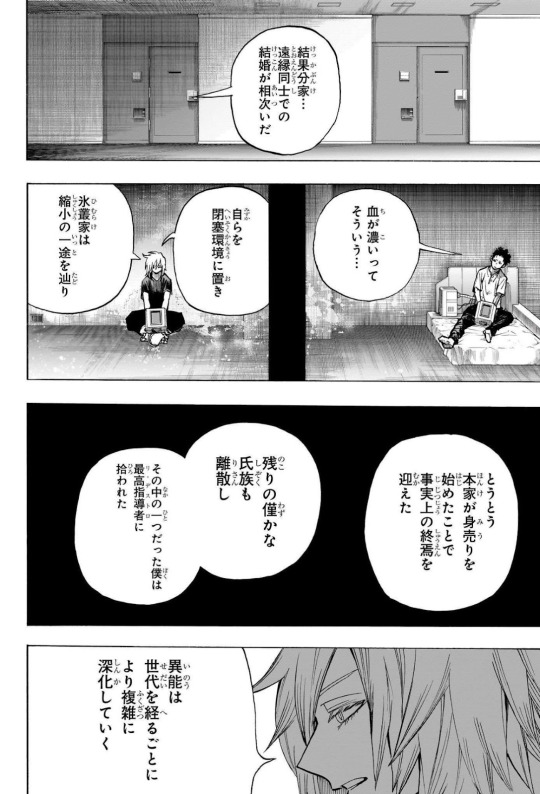
結果分家…遠縁同士での結婚が相次いだ
けっかぶんけ…とおえんどうしでのけっこんがあいついだ
= “As a consequence of [these] branch families… marriages among distant relatives occurred one after another.”
血が濃いってそういう…
ちがこいってそういう…
= “That’s what you meant by thick blood…”
自らを閉塞環境に置き火叢家は縮小の一途を辿り
みずからをへいそくかんきょうにおきひむらけはしゅくしょうのいっとをたどり
= “By placing themselves in a closed [genetic] environment, the Himura family continued to shrink,”
とうとう本家が身売りを始めたことで事実上の終焉を迎えた
とうとうほんけがみうりをはじめたことでじじつじょうのしゅうえんをむかえた
= “and when eventually the main family began to sell themselves [into marriages with members of other prestigious families], it came to a de facto end.”
残りの僅かな氏族も離散し
のこりのわずかなしぞくもりさんし
= “The few remaining families are scattered.”
その中の一つだった僕は最高指導者に拾われた
そのなかのひとつだったぼくはリ・デストロにひろわれた
= “I was one of them and was picked up / taken in by Re-Destro (read as: the Supreme Leader).”
異能は世代を経るごとにより複雑に深化していく
いのうはせだいをへるごとによりふくざつにしんかしていく
= “As meta abilities pass through generations, they deepen in complexity.”
In other words, Quirks have grown more complicated and therefore more difficult to understand and manage with each successive generation. Quirk Singularity is real, BUT NOT EVERYONE EXISTS AT A SINGULARITY. ALL QUIRKS ARE NOT CREATED EQUAL. THE POINT OF QUIRK MARRIAGES WAS TO COMBINE POWERFUL QUIRKS TO EXPEDITE THE SPEED WITH WHICH A PERSON WOULD ACHIEVE A SINGULARITY, TIPPING THE BALANCE OF POWER IN FAVOR OF THOSE WITH THE STRONGEST QUIRKS. EVEN AMONG CLOSE BLOOD RELATIVES, SOME MEMBERS WILL HAVE INHERITED DIFFERENT COMBINATIONS OF GENES PRODUCING DIVERSE RESULTS. IT IS POSSIBLE FOR ONE MEMBER OF A FAMILY TO HAVE REACHED SINGULARITY AND ANOTHER NOT. FUYUMI AND NATSUO ARE NOT SHOUTO, AND SHOUTO IS NOT TOUYA. QUIRK SINGULARITY IS NOT A “GOOD” OR BENEFICIAL THING. AT THAT POINT, A QUIRK BECOMES UNCONTROLLABLE, HIGHLY VOLATILE, AND DANGEROUS TO ITS USER. THE PERSON IS BEING DRAGGED BY THE QUIRK. THEY DO NOT HAVE A QUIRK; A QUIRK HAS THEM.

濃く深く堆積した因子には本人すら知覚し得ない力が眠っているかもしれない
こくふかくたいせきしたからだにはほんにんすらちかくしえないちからがねむっているかもしれない
= “In thickly and deeply layered bodies (read as: [Quirk] factors) may lie latent abilities / power even the person themselves is unaware of.”
だが人は心を置き去りにしたままだ
だがひとはこころをおきざりにしたままだ
= “But people still just abandon their hearts.”
The word commonly translated as “Quirk” is kosei, meaning “individuality; personality; quirk; idiosyncrasy; character; individual characteristic.” By definition, then, Quirks are more than cool special features some people “have” and some people “don’t have.” They’re an expression of the self, a peek into who a person is, their “heart” or “nature.” The Quirk reflects the person as much as the person reflects the Quirk. To deny one’s Quirk is to deny one’s self. To reject the Quirk is to reject the person. Under this definition, and if we think of Quirks as windows into the soul, so-called “Quirkless” people also have a Quirk: being “Quirkless.” If Quirks are manifestations of a person’s individuality or personality, then Quirkless people would be characterized by a weak or nonexistent sense of self (and subsequently, an underdeveloped sense of self-preservation and exaggerated tendency toward self-sacrifice).
明日…何が変わるだろう
あす…なにがかわるだろう
= “Tomorrow… I wonder what [tomorrow] will bring.”
変わる (romaji: kawaru) is a verb meaning “to change; to be transformed; to be altered; to vary (e.g., the weather may be changeable, prone to sudden dramatic shifts).”
Geten assumes the world will be changed by the war and is wondering how it will be different.
さァ次はおまえだ
さァつぎはおまえだ
= “Well, next is you.”
警察・ヒーローと何を話してた?
けいさつ・ヒーローとなにをはなしてた?
= “What were you talking about with the police and Heroes?”
何でもいい聞かせろこの戦いが終わるまでの暇つぶしに
なんでもいいきかせろこのたたかいがおわるまでのひまつぶしに
= “Let me hear anything to kill time until this war comes to an end” or “Anything [you want to tell me] is fine [by me] to kill time until this war comes to an end.”
Geten is anxious about the outcome of the war. He is requesting that Atsuhiro help him fill the silence. Any words will do. All that matters is that he is not left alone with his thoughts.
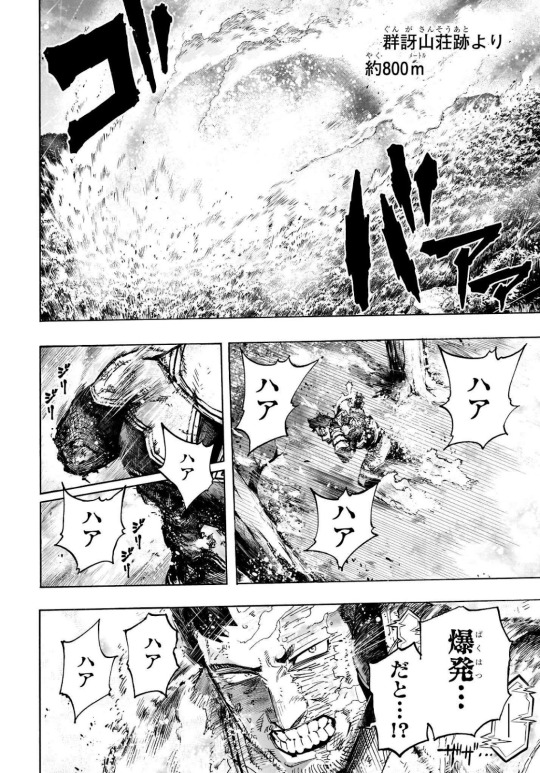
群訝山荘跡より約800m
ぐんがさんそうあとよりやく800メートル
= Approximately 800 [Meters] from the Gunga Mountain Villa Ruins
ハア
Note: This is an onomatopoeia for the sound of heavy panting/breathing. You’ll notice it repeated several times on this panel. Enji is exhausted and struggling.
爆発… だと…⁉︎
ばくはつ… だと…⁉︎
= “Explosion…!?”
This has no real bearing on the translation, but I do want to address it since my translation of this line differs slightly from Pikahlua’s (“An explosion… you say…!?”) and some may wonder why. だと (romaji: dato) is formed by the copula da and the quoting particle to. It expresses surprise or disbelief at something someone has said. Here, Enji is quoting something he has heard (i.e., that any time now Touya will explode, killing them all) and expressing his incredulity at the news. Dato is commonly translated in English as “you say,” but it might also be conveyed simply by the inclusion of an interrobang, that is, the exclamation point + question mark combination at the end of a sentence. Maybe it’s because I write fiction from time to time, but when I am translating, I read the text out loud to hear how it sounds. Sometimes a line sounds better in one language than it does another. To my ears, “explosion… you say…!?” sounds kind of weird and unnatural. How often do you hear a native English speaker speak like that? And yet, native English speakers express surprise or disbelief at something they’ve heard all the time. So, I opted to let the interrobang do the talking. The meaning of the sentence isn’t affected by whether the translator decides to translate dato directly into written form (i.e., “you say”) or not. Context and interrobang are enough on their own to convey that the speaker is shocked by something they have been told.
ハア
Note: This is an onomatopoeia for the sound of heavy panting/breathing. You’ll notice it repeated several times on this panel. Enji is exhausted and struggling.

避難ブロックだけじゃない…
ひなんブロックだけじゃない…
= It won’t just be the evacuation blocks…
今トガの増殖を抑えてるピクシーボブたちもーーー‼︎
いまトガのぞうしょくをおさえてるピクシーボブたちもーーー‼︎
= Pixiebob and the others currently suppressing Toga’s proliferation———!!
いかん…AFO戦のダメージが脚に来ている…!
いかん…オール・フォー・ワンせんのダメージがあしにきている…!
= This is bad… The damage from the AFO battle is spreading to my legs…!
Notice how Enji’s body is drawn: with his right side emphasized (toward us), calling attention to his amputated arm and gouged side. If you recall from No.354, Endeavor sustained a nasty injury not unlike the one that ended All Might’s Hero career. It is the reason All Might regularly coughs blood. These critical injuries are definite parallels, with Endeavor’s injury being to his right side and All Might’s to his left. Mirrors. This is not the first time the two rival Heroes have mirrored one another. During his career-defining encounter with the High-End Noumu called Hood, Endeavor raised his right fist to signal his triumph over his opponent, recreating All Might’s iconic victory pose but with the opposite arm. Unlike All Might, however, Enji also lost his right arm in his fight against AFO and was forced to cauterize his wounds closed, potentially further damaging internal structures and tissues, or else bleed to death on the battlefield. Cauterizing an injury might buy a person time getting to a hospital, but it does not solve the problem of significant blood loss due to amputation and/or maiming, nor does it mitigate the risk of infection leading to the development of sepsis and multiple organ failure. I know, I know. BNHA is a work of fiction and fiction is seldom an accurate representation of reality, but it is worth bearing in mind that Toshinori continues to suffer medically due to his years-old injuries. His survival came at a steep cost, a cost paid by the losses of his career, health, and quality of life. Assuming Endeavor survives the war, he will likely have similar issues.
That Endeavor’s lower half is now being affected by AFO’s mutilation of his upper half suggests that more is going on internally than is apparent. It’s worse than it looks.
これ以上燈矢を誘導して遠くへ向かうには———…
これいじょうとうやをゆうどうしてとおくへむかうには———…
= [I don’t think I can] lead Touya any farther away———...
あっ
= “AH”
お
= “OH”

おどおさん
= “DAAAD,”
見で
みで
= “LOOK.”
見でええ
みでええ
= “WAAATCH [ME].”
Let’s talk about how Touya is speaking, because it is indicative of his collapsing mental state. The first thing Touya says is お父さん (romaji: otousan), meaning “father; dad.” This is the most common and most respectful way for Japanese children to address their fathers, but Touya slightly mispronounces it, softening the harder “t” sound into a rounder “d.” Otousan becomes odousan. He also elongates the “o” sound that forms the middle of the word. So, otousan becomes odouusan. In English, Touya is just saying “dad,” but in Japanese, there is a subtle pronunciation difference that deviates from Touya’s norm, clueing us in that something is wrong.
見て (romaji: mite) is the te-form of the verb 見る (romaji: miru), meaning “to see; to look; to watch; to view; to observe.” It can also mean “to look after; to attend to; to take care of; to keep an eye on.” This word and the concept of seeing or watching plays a pivotal role in the Todoroki subplot, particularly in relation to Touya, Enji, and Rei’s characters, with Touya begging to be seen, Enji and Rei admitting to not seeing him, and Endeavor asking the frightened civilians (and Shouto) to watch him. Something I don’t see discussed enough is the nuance of this word. Yes, it means “to see; to look; to watch” and is usually translated as such, but it can also mean “to look after; to attend to; to take care of (e.g., in a medical or caretaking sense, the way a doctor or nurse does a patient or a good parent does a child).” It is a gross oversimplification of Touya’s character to say he is just “throwing the tantrum of a lifetime because Daddy and Mommy didn’t look at him enough / pay him enough attention.” Touya is asking for more than to be acknowledged. He is asking to be taken care of, to be loved and sympathized with and understood and held and protected in exactly the way every child needs and deserves. “SEE ME. CARE FOR ME.” People need people. Children need their parents. I say this as the oldest sibling who did my damndest to “raise” and shield my younger siblings from the chaos and dysfunction of our household: Siblings are not enough, can never be enough, and can never replace the unconditional love and support of a warm, emotionally attuned parent. Neither can friends or found family. Relationships come in many forms. Love comes in many forms. Healing comes in many forms. But at his core, Touya is still that wounded little boy abandoned and forgotten by his father and mother who needed them desperately and cried out for a decade before self-immolating on Sekoto Peak for anyone to help him because his best childhood efforts to help himself weren’t enough to stop his downward spiral. His every bid for connection fell on deaf ears because his father and mother BOTH lacked the emotional maturity, psychological wellness, knowledge, and skills to support him, and his siblings were children themselves, unable to meet his needs or their own.
Regardless of how we might feel about them as parents (if you are familiar with my posts, you know I have LOTS of strong feelings about that), it is important to recognize that Enji and Rei were themselves wounded children who grew up to be wounded adults who were not supported to become the best versions of themselves. Their chances of raising happy, healthy, well-adjusted children without first doing the work to become happy, healthy, well-adjusted individuals were slim to none. Touya is unique in that he is the only Todoroki sibling not shown to form part of a protective pair during his time in the house. Playing with your siblings is not the same thing as being supported by them. When Touya cried, he cried alone without anyone to comfort him. When Touya burned, he burned alone. When Enji was terrorizing Rei or Shouto, Fuyumi and Natsuo held one another while Rei and Shouto moved to defend and console the other. Where was Touya? We don’t know. He was literally not pictured, an artistic choice designed to render him as invisible to us, the reader, as he was to his family. What we can be certain of is that wherever Touya was, he was crying… and burning. Everyone in the family suffered. Touya suffered differently. He is both a product and a reflection of his parents’ personal failures. Enji has attempted to carry the burden of accountability for Touya’s outcome entirely on his shoulders, as if he alone was the “problem” and the “solution,” but there is one other person who shares that responsibility, and it’s not Shouto. It’s Rei, Rei who is Touya’s mother, his other parent. She, too, failed to nurture, protect, and care for her children, and Touya died and became Dabi as a result of her (and Enji’s!) inadequacies. In No.302, Rei said that everyone in the family would have to “take responsibility for what happened and what happens next,” but she was wrong and shifting blame. It is Rei and Enji who must take responsibility, because it is they who were responsible for Touya, not Fuyumi or Natsuo or Shouto. Hopefully, we’re moving toward them actually doing that. Hopefully.
Circling back to the translation, Touya means to say “miTe.” What he actually says is “miDe.” This is someone who chooses his words carefully and speaks with intention, so it is absolutely cause for concern that he is mispronouncing common words.
Before we move on to the next panel, I want to point something out that would be easy to miss if you’re the kind of person who skims the pages without taking the time to reeeeaaaallllyyyy look at the illustrations.
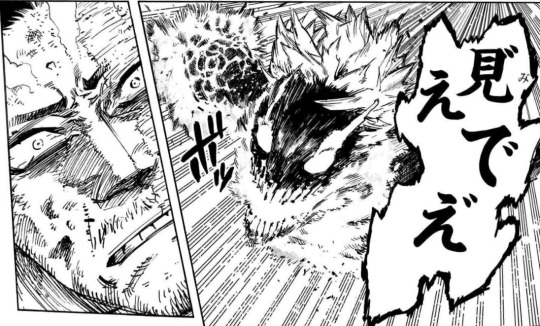
Take a good, long, hard look at Touya’s right arm, the one he’s swinging toward Endeavor. It is literally shattering into pieces as it swings forward. During the post-death cremation process, after which Dabi is named, the body is reduced to its essential elements via exposure to open flame, intense heat (1400-2000°F), and evaporation. The tissues, organs, and fat of the body are destroyed. This is known as primary combustion. During secondary combustion, the inorganic particles that remain after primary combustion, which consist mainly of carbon dioxide and water vapor, discharge, leaving behind bone fragments that are then pulverized into “ashes,” at least in the West. In the East, these pieces of bone are collected and placed in a funerary urn for burial, which may happen immediately or some time after the cremation ceremony (Dabi). Touya is cremating while still alive. Charred pieces of tissue and bone are being thrown from his body with every move. This is not new. This is not something Endeavor, who, for all his running, has yet to attack Touya, did. This is something that was happening from the moment Touya found himself warped to the Kamino Ward with Shouto instead of Endeavor and that Shouto sped along, whether he intended to or not, by repeatedly attacking Touya. If you go back to those chapters, you’ll notice black flecks of burnt skin and other tissues being blasted off of Touya’s body every time Shouto strikes and light peeking through the tiny holes forming in his body. Phosphor was specifically created to protect Shouto (and other Heroes) from Touya’s flames by holding Shouto’s internal temperature steady and neutralizing Touya’s incredible heat, rendering him powerless to defend himself and/or harm others. Every second Touya spent with Shouto pushed him closer to death.
Let’s quickly talk about names and the implications of them. The kanji for Touya’s name are 燈矢, meaning “light; lamp; lantern; candlelight” and “arrow,” respectively. The accompanying hiragana, which tell us how to pronounce the name, are とう (romaji: tou) and や (romaji: ya). These hiragana can also mean “training; education; cultivation,” which is fitting because one of Touya’s defining attributes is his awesome work ethic and commitment to continuous self-improvement. The impression of the name is of something on the climb, soaring high above the clouds, which is also fitting as this is exactly what Enji hoped and believed Touya would do. If you are familiar with the kanji for Shouto’s name, you know they translate to “burn” + “freeze.” Clearly, he was named for his Quirk. For Enji, Touya was person before Quirk, his son; Shouto was Quirk before person, his masterpiece and means to an end. But what of the hiragana for Shouto’s name? These are しょう (romaji: shou), also the hiragana associated with the kanji (= 賞) for “prize; award,” and と (romaji: to). This combination of hiragana bears a striking resemblance to the hiragana for 消灯 / しょうとう (romaji: shoutou), meaning “to put out the light; to turn off the lights.” If Touya = “light,” then Shouto = one who does away with the “light.” As sad as it is and as disturbing as it might be, Shouto’s birth all but guaranteed Touya would die.
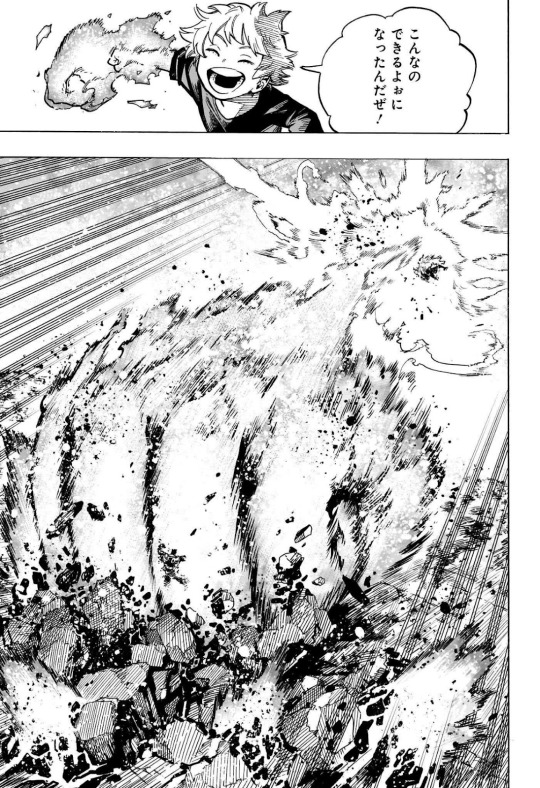
こんなのできるよぉになったんだぜ!
= “I’ve become able to do something like this!” or “I can do this now!”

炎を止めろ燈矢…‼︎
ほのおをとめろとうや…‼︎
= “Stop the flames, Touya…!!”
He can’t, couldn’t if he wanted to. Touya’s Quirk is tied to his emotions. The more panicked he is, the more frenzied his attacks will be. Look how chaotic his movements are. He’s losing his shit.
見でええ みでええ
= “WAAATCH [ME].”
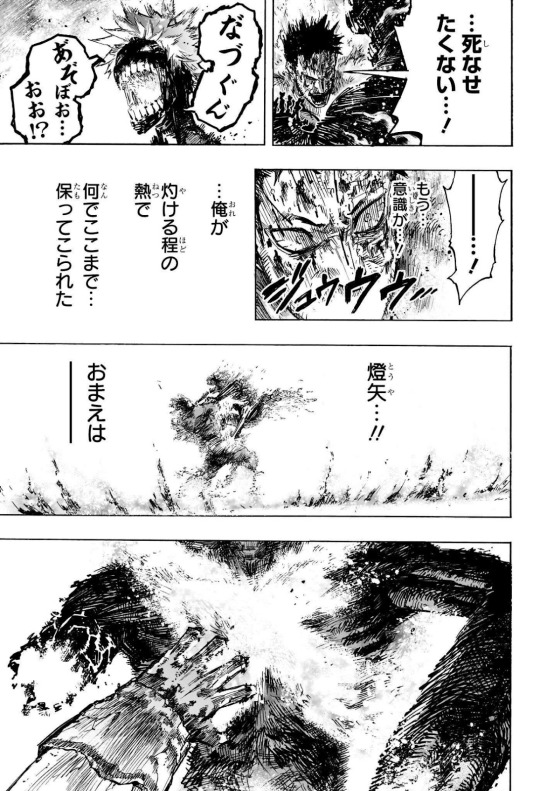
…死なせたくない…!
…しなせたくない…!
= “... I don’t want you to die…!”
なづぐん
= “NATSU-KUN,”
This is also mispronounced. He means “Natsu-kun,” but he says “Nadzu-gun.”
あぞぼお…おお⁉︎
= “LET’S PLAYY…YY!?”
もう…意識が…!
もう…いしきが…!
= [His] consciousness… is already…!
This is Enji realizing that it’s too late for Touya. Once again Enji kept Touya waiting and missed every opportunity (and there have been many) to reach (and “save”) him, allowing himself to be persuaded to entrust Touya to someone else (= Shouto), just like he did when Touya was a child, because it benefitted everyone else more for Touya to be dead last on the Number One Hero’s list of priorities than first. More than anyone, Touya needed his father. More than anyone, Touya hoped his father would come through for him. More than anyone, Touya believed his father would. And more than anyone, Touya’s father has devastated him and taught him again and again that he does not matter. His pain does not matter. His life does not matter. And his (second) death will not matter (just like his first didn’t).
…俺が灼ける程の熱で
…おれがやけるほどのねつで
= … [This] heat is enough to burn [even] me.
The word used here for “heat,” netsu, can also mean “zeal; passion; enthusiasm.”
Let’s put netsu in the context of Touya’s Quirk. Enji said about Touya that he was born with talent and firepower greater than his own. We know from No.301-302 and from No.267 that the strength and intensity of Touya’s flames is influenced by his emotional state. If Enji’s zeal, passion, and enthusiasm [to become superhuman and prove it to himself by surpassing All Might, a “real superhuman”] burned hot enough to blind him to how his family was being impacted, Touya’s burns even hotter. The more desperate Touya becomes, the more destructive his fire will be. His emotions dictate his Quirk, and his Quirk dictates his behavior. Touya does not “possess” a Quirk in the traditional sense, like Uraraka or Kirishima or Mineta do. A Quirk possesses him.
何でここまで…保ってこられた
なんでここまで…たもってこられた
= How has he… endured [the heat and not died] up to this point?
燈矢…‼︎
とうや…‼︎
= Touya…!!
おまえは———
= You———
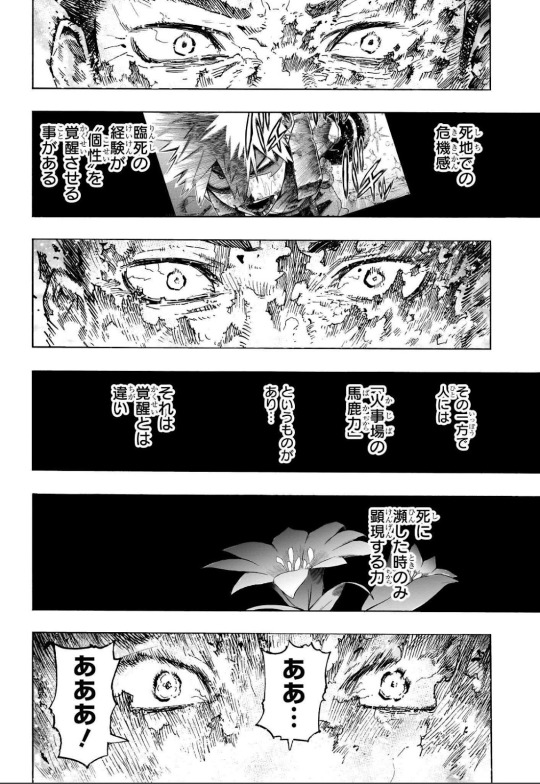
死地での危機感
しちでのききかん
= [A person’s] sense of impending crisis [in the face of] almost certain death.
臨死の経験が"個性"を覚醒させる事がある
りんしのけいけんが"こせい"をかくせいさせることがある
= There have been cases of Quirks being awakened by near-death experiences.
その一方で人には「火事場の馬鹿力」というものがあり…
そのいっぽうでひとには「かじばのばかちから」というものがあり…
= On the other hand, people [have been known to] have something like ‘hysterical strength at the scene of a fire.’
馬鹿力 (romaji: bakajikara) literally translates to “stupid strength.” Several online dictionaries return these additional definitions: “hysterical strength; animal strength; great physical power.” However it is translated, bakajikara refers to the superhuman strength, speed, agility, and endurance that a person might experience under extreme physiological stress to help carry them through a high stakes event, such as being trapped in a burning building or fighting off an assailant. Recently I read a news article (and watched a video) about a family whose apartment caught on fire with the mother and children inside. Neighbors and passersby called for the mother to jump from the balcony with the small child she was carrying in her arms, but again and again she ran back through the flames to retrieve her other children. After dropping the second child to the safety of the civilians down below, she was on fire and dying, but she braved the flames one more time to save her third and final child. Then she dropped dead on the balcony. Her injuries were so horrific, she could not even be visually identified as a biological female. Had it not been for her children clarifying that they were home alone with their mother when the fire started, the police would not have known who she was. But how did she do it? How did she keep moving long enough to save her children, even as she was burning beyond recognition? Love… and “stupid strength.”
それは覚醒とは違い
それはかくせいとはちがい
= That’s different from an awakening.
死に瀕した時のみ顕現する力
しにひんしたときのみけんげんするちから
= [A] power / ability that manifests only when [a person is] on the brink of death.
ああ…
= “Yes…”
あああ!
= “I get it!”

冷の
れいの
= Rei’s
"個性"…‼︎
"こせい"…‼︎
= Quirk…!!
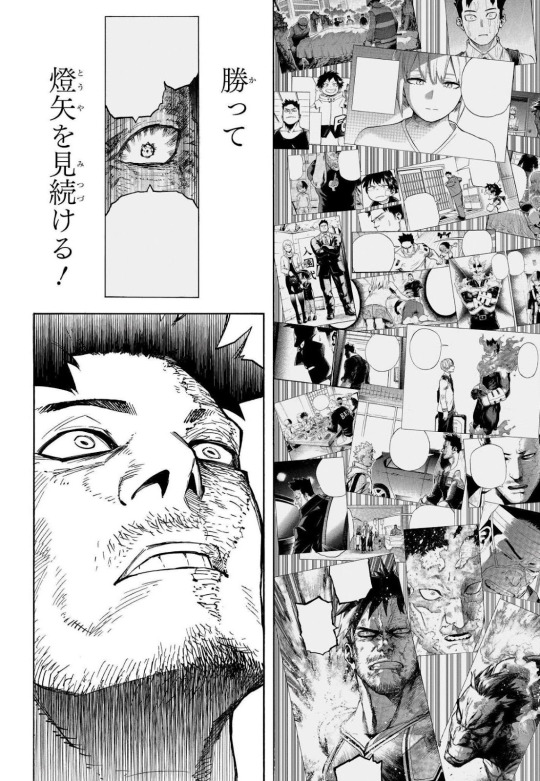
勝って燈矢を見続ける!
かってとうやをみつづける!
= [I will] win and keep seeing / watching Touya!
This is a flashback to No.357 when Endeavor set his intention to defeat AFO and continuously see / look after Touya. It sounds to me like he was hoping to win to save and save to win.

全部俺の責任だ
ぜんぶおれのせきにんだ
= “This is all my fault.”
全部背負って償いに生きねばと思っていた
ぜんぶせおってつぐないにいきねばとおもっていた
= “I thought [that I had] to bear the burden of responsibility for everything and live to make amends.”
でもおまえはずっと俺を見続けてたんだもんな…
でもおまえはずっとおれをみつづけてたんだもんな…
= “But all along you kept watching me, even though…”
おまえを見てやれなかった……
おまえをみてやれなかった……
= “I couldn’t see you……” or “I couldn’t look at you……”
It’s not that Enji didn’t know Touya was suffering. It’s that he didn’t want to know it, because the knowledge that his actions had destroyed his son’s mental health was overwhelming and terrifying and made him feel weak and powerless to do anything but play out the same tired routine day after day to make Touya’s—and his late father’s—destruction mean something. That feeling of powerlessness [probably, almost certainly] reminded him of being a kid helpless to save his father and determined to never feel that way again, so he ran. It was easier to bury his head in the sand and pretend not to see the damage he had done to the person who trusted, believed in, loved, and needed him most. I wouldn’t be surprised if Enji’s relationship with Touya prior to his “death” by fire mirrored his relationship with his own father, another flame-user who also tragically perished in a fire. I especially wouldn’t be surprised if that is the case because that dynamic seems to be implied to be generational in No.356.
But Enji isn’t the only one who turned a blind eye to Touya’s despair. Touya was falling apart emotionally and physically, so Rei abandoned him and the others and attached herself to Shouto, Shouto who never held her accountable for her part in the family dysfunction and still showed promise, promise that ensured Enji would continue financially supporting her and the Himuras so they didn’t have to adapt to the modern era that didn’t reward them for no other reason than that they were Himuras by—I don’t know—getting a job like everyone else who can’t get by on a name alone. Fuyumi coped with her traumatic home life by becoming a person who sweeps problems under the rug, pretends they don’t exist, and implicitly shames others (e.g., Natsuo, Shouto) for not doing the same and “letting bygones be bygones.” The Todorokis, namely Enji, Rei, and Fuyumi, collectively chose to avert their eyes and deny, deny, deny. Natsuo isn’t totally blameless either. In No.302, Natsuo, now an adult and student in the mental health field, remarks that he should have “punched [Enji] and confronted Touya,” a loaded, victim-blaming comment that all but confirms he believes Touya (but not Rei?) also was at fault for the family’s problems. This is not at all uncommon in abusive households, but it is problematic in that it attributes blame as much or more to victims than to perpetrators. And yes, I realize that Rei, too, was a victim and yet I am assigning culpability for her children’s adverse childhood experiences both to her and to Enji, the (primary) perpetrator. The difference is that Rei was an adult, while the children were minors incapable of advocating for themselves or seeking help from external sources. They were dependents forced by age, developmental stage, and a lack of financial resources to rely on adults to meet their needs. Ultimately, Rei, not unlike Enji, was an adult with a responsibility to her children that she failed to uphold.
おまえにも償わなきゃいけなかったんだ
おまえにもつぐなわなきゃいけなかったんだ
= “I needed to atone to you as well.”
No shit? Why is this being treated like some kind of revelation? Wasn’t Enji trying in some small way to do right by Touya by doing right by Izuku, who reminded him of Touya? Wasn’t Enji’s “I will win and continue watching Touya” line a sign that he understood he needed to atone to Touya and how? What are we doing, Horikoshi? It feels like we’re taking one step forward and two steps back.
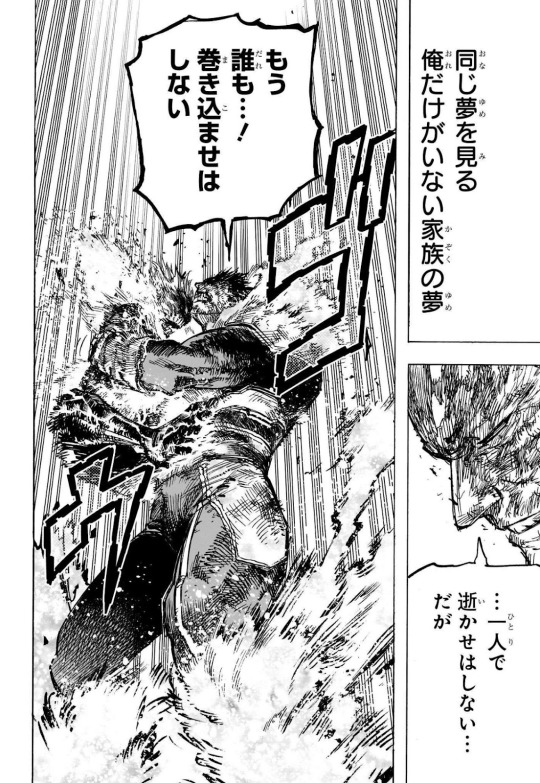
同じ夢を見る俺だけがいない家族の夢
おなじゆめをみるおれだけがいないかぞくのゆめ
= I dream the same dream of my family, but without me.
You might remember this line from No.249, where it or a variation of it appears twice, once at the beginning of the chapter and once at the end of the chapter. Here both scenes are, translated from Japanese into English for your convenience:
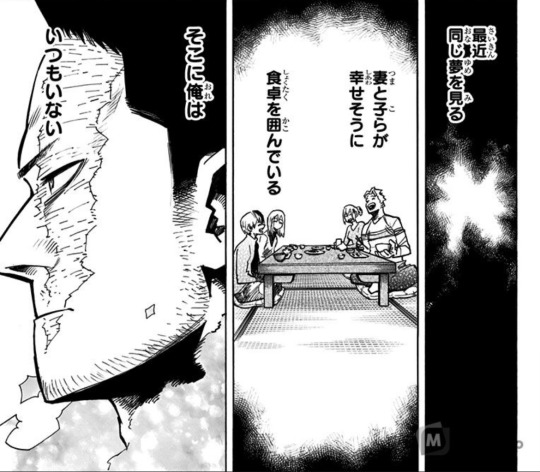
最近同じ夢を見る
= Recently [I] have the same dream.
妻と子らが幸せそうに食卓を囲んでいる
= My wife and children sit happily around the dining table.
そこに俺はいつもいない
= I’m never there [with them].

自分が家の為に今更何ができるのか
= What can I do [at this late stage, when it is already much too late] for the sake of my family?
最近同じ夢を見る
= Recently [I] have the same dream.
おまえもそこにいてほしかった燈矢
= [I] wish you were there too, Touya.
(That concludes our visit to the past. Let's jump back into the translation for No.387!)
…一人で逝かせはしない…だがもう誰も…!
…ひとりでいかせはしない…だがもう誰も…!
= “... I won’t let you die alone… but no one else…!”
巻き込ませはしない
まきこませはしない
= “[We] won’t involve [anyone else]!”
Enji’s plea for Touya to not “involve” anyone else echoes Shouto’s call for the same in No.351-352 (except Shouto added “take it all out on us,” with “us” referring either to the Heroes or to the Todoroki family as a whole). Whether Shouto meant for Touya to direct his anger at the Heroes or at the Todoroki family in its entirety, he did NOT intend to be the only one on the receiving end of it. Shouto intended to limit the damage to himself and some others. Enji intends to limit the damage to just Touya and himself.

地上の移動では間に合わない
ちじょうのいどうではまにあわない
= [They] won’t [be able to] evacuate [the area] above ground in time.
This might also be translated as “[I] won’t [be able to] cover enough ground in time,” as in Touya will explode before Enji can put sufficient distance between the two of them and everyone else to minimize the impact of the blast. He knows Touya is dying and plans to die with him as his father, but as a Hero (and the Number One Hero no less) he is still trying to save lives.
Note: The skin of Touya's chest and shoulders are breaking off. His body now resembles cracked earth disturbed by an underground volcanic eruption.

燈矢 おまえの火力も借りて空に———
とうや おまえのかりょくもかりてそらに———
= Touya, [I am] borrowing your firepower to [launch us] into the sky———
待て…待ってくれ…!
まて…まってくれ…!
= Wait… please wait…!
もう少しだけ———!
もうすこしだけ———!
= Just a little longer———!
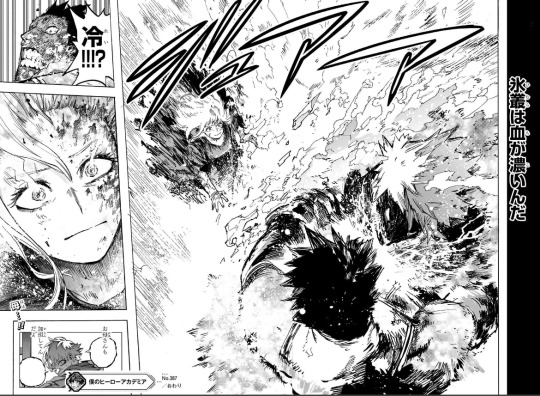
火叢は血が濃いんだ
ひむらはちがこいんだ
= Himura blood is thick.
冷!!⁉︎
れい!!⁉︎
= “Rei!!!?”
This is Enji reacting to Rei’s presence, if that wasn’t clear by the close up of his face followed by hers. If you look closely at the position of Enji’s head on the right side of the panel you’ll notice that he has turned his face toward Rei, away from Touya. His expression is one of shock and horror. This is someone who has just learned that his son will explode, killing everyone within a large radius, from evacuees to Heroes and even other Villains. Everyone caught in the blast will be incinerated. Here he was hoping to save countless lives by limiting the damage to just himself and Touya (not unlike Shouto, who yelled for Touya to “take it all out on us” and not “involve” anyone outside the family), and here Rei is, pushing her way through the flames into the fray. If Touya burns, he, Enji, and Rei will burn together. That fits, because Enji doesn’t actually bear sole responsibility for Touya’s outcome now or then. Rei is his mother, and as his mother, she, too, bears that burden. Enji failed to be a “good enough” father to Touya, and Rei failed to be a “good enough” mother to him. As she said in No.302, she also didn’t see Touya. She also turned away from him. She also abandoned her son when he became more than she knew what to do with. So when he died at thirteen years old after enduring a decade of parental abuse and neglect, his blood was on her hands as much as on Enji’s, because she didn’t do enough to help him when he was at his weakest and most vulnerable. And look, I know Rei had it hard and was suffering, but she still had a responsibility to the children she helped to create to nurture, protect, and care for them, a responsibility she and Enji both fumbled. The sad reality is that parents can love their children and still fail to do right by them. Parents can want the best for their children and still not be the best for them. Touya suffered for having had Enji as his father, and he suffered for having had Rei as his mother. What has happened is on both of them. What happens next is on both of them.
お母さんも
おかあさんも
= “[You] too, Mom.”
Literally, Touya says, “Mom too.”
加担してんだよ
かたんしてんだよ
= “You’re complicit.”
End Tagline:
母…‼︎
はは…‼︎
[His] mother…!!
End.
#bnha manga#mha manga#bnha manga spoilers#mha manga spoilers#bnha 387#mha 387#dabi#touya todoroki#endeavor#enji todoroki#rei todoroki
27 notes
·
View notes
Text
木曜日 2023/10/12
こんにちはみんなさん!
みんなは元気?私はまあまあ。木曜日はあまり好きじゃない。:/
今日のトピック:や、~なければいけません、midterm review
So this past 金曜日 was the midterm. It wasn't that bad and we already got our scores but I wanted to go over our midterm review sheet.
I have a challenge for you! I want you to write down what you think the answer is based on my previous posts. There are one or two grammar points I don't think I've gone over with you, so I'll do that now.
The final grammar points i need to cover are や And ~なければいけない/なきゃいけない
Let's start with や!
や connects two nouns like と except や suggests that the things referred to are proposed as examples and that you are not exciting an exhaustive list. It's similar in the way that たり is used. 練習しましょう。
AやB (A and B, for example)
東京や大阪に行った。I went to tokyo and osaka (and may have visited other places)
おにぎりやラーメンを食べた。I ate onigiri and ramen. (and may have eaten other things)
Honestly there's not much else to it. It's really straightforward!
Next is ~なければいけない/なきゃいけない
This is used to say when something has to/must be done. ねければ is the more formal version and its more often seen in the written language while なきゃいけない is more colloquial and mainly found in the spoken language. To conjugate, you need your verb in the present negative form. For example:
勉強する>勉強しない>勉強しなきゃいけない
作る>作らない>作らなければいけない
歌う>歌わない>歌わなきゃいけない。
待つ>待たない>待たなければいけない
食べる>食べない>食べなきゃいけない
Let's do some practice sentences!
火曜日に日本語の試験(しけん)があるので、たくさん勉強しなければいけません/いけない。Because I have a japanese exam on tuesday, i must study a lot.
もうすぐ母は家に帰るので、車を洗わなきゃいけません。Because my mom is returning home soon, i have to wash the car.
食べすぎたので運動しなければいけません。Because I ate too much, I must exercise.
今、私の双子はフランスに住んでいるので、手紙(てがみ)を送らなきゃいけません。Because my twin is living in France right now, I must send letters.
熱があって、喉(のど)が痛(いた)いので、薬を飲まなければいけません。Because I have a fever and my throat hurts, I must take medicine.
And that's about it! Congratulations reader, you got through (almost) all the genki lessons!! Here's to another successful semester. 頑張れる!!
Let's move on to the midterm review. Do you have your pencil and paper ready? (bonus points if you write the kanji)
Our midterm review was in the format of a story. 始めましょう
You are an exchange student in tokyo. You are on your way back to Tokyo from a one day trip to Oze. The train stopped half way for a while due to a minor road accident. You get bored, so you start talking to a woman/man sitting next to you. The person asks you “where are you from?” how would you say this in japanese?
出身(しゅっしん)はどこですか。
Ask the person has ever been to foreign countries
外国(がいこく)に行ったことがありますか。
The person commented that your Japanese is very good. Be humble like Japanese people and say “No, no. I have to study more”
いいえいいえ。もっと勉強(べんきょう)しなければいけません。/勉強しなきゃいけません。
Go on to say “i want to become better at japanese”
日本語がもっと上手(じょうず)になりたいです。
The train finally starts moving. You ask the person where they are going now. The person says, “I wanted to buy clothes. I'm going home now.”
ふくを買いたかったんです。でも、今から家に帰ります。
The person continues to say, “I need to cook tonight because my mother is sick.”
母がかぜをひいているので、今晩(ばん)料理(りょうり)しなければいけません。/しなきゃいけません。
You ask the person if his/her mother is all right. The person tells you, “she caught a cold and has a fever. But she is okay.”
かぜをひいて、ねつがあるんです。でも大丈夫ですよ。
The person goes on to say, “but she’d better not work today. She should sleep a lot.”
今日は働かないほうがいいですね。たくさん/よく寝たほうがいいですよ。
I wrote down たくさん while my teacher wrote よく and i was a little confused but i think you can use either.
You ask the person what dish you are good at making. The person answers i often make curry rice, pork cutlet, tempura, and so on
よくカレーライスやとんかやてんぷらを作ります。
The person asks you if you cook a lot. Tell the person that “I want to cook more but I am too busy.”
もっと料理したいですが、いそがしすぎます。/いそがしすぎるんです。
The person tells you that they have to do an English homework assignment. You ask the person what they do in class. she/he says, “we read english books, write essays, listen to the news, and so on.”
私たちは英語の本を読みたり、作文(さくぶん)を書いたり、ニュースを聞いたりします。
You ask the person if they practice speaking as well. The person says, “I took the conversation class for a month but I quit.”
一ヶ月間(いっかげつかん)、会話のじゅぎょうをとりました。でもやめました。/とりましたが、やめました。
The person says, “the teacher's english was too fact! But I am interested in English conversation.”
先生の英語は早すぎたんです。/早すぎました。でも、英語の会話にきょうみがあります。
((に)きょうみがあります=to have an interest in)
You offer some help. You tell the person that you can be his/her English conversation partner. You both decide to tutor English and Japanese to each other. You get off the train in a happy mood.
The next day your advisor at school tells you that you looked very happy. Yell your advisor with a lot of excitement, “i met a fantastic woman/man on the train yesterday!! We will practice English and japanese!!” (hint- use んです)
昨日、電車ですてきな女の人/男の人に会ったんです!私たち/いっしょに英語と日本語をれんしゅうするんです。
How’d you do? Comment how much you got! I'd love to see your scores. If You didn't get them, no sweat! A lot of my answers were different from what my teacher wrote..
I want to apologize if these lessons feel rushed. I'm trying to not make them feel that way.
じゃあ、皆さん、お疲れ様!!
今日の歌は&TEAM - UNDER THE SKINです。
Notice any errors? Lmk!! I always want to fix my mistakes so I can learn better. ありがとう!
12 notes
·
View notes
Text



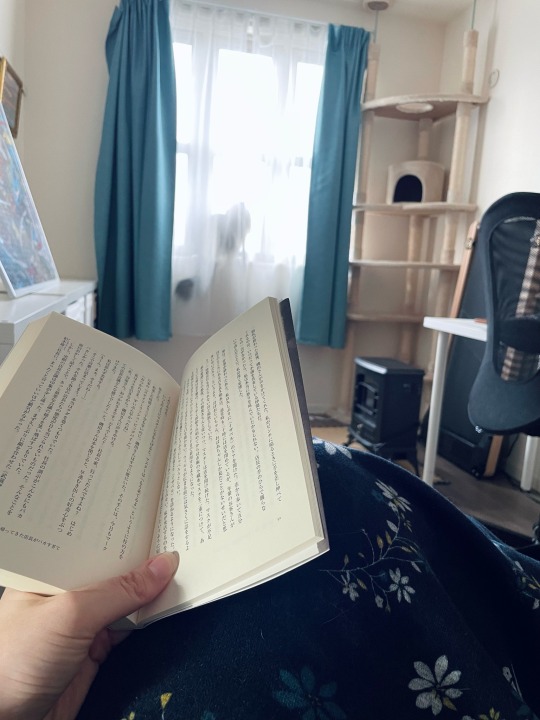
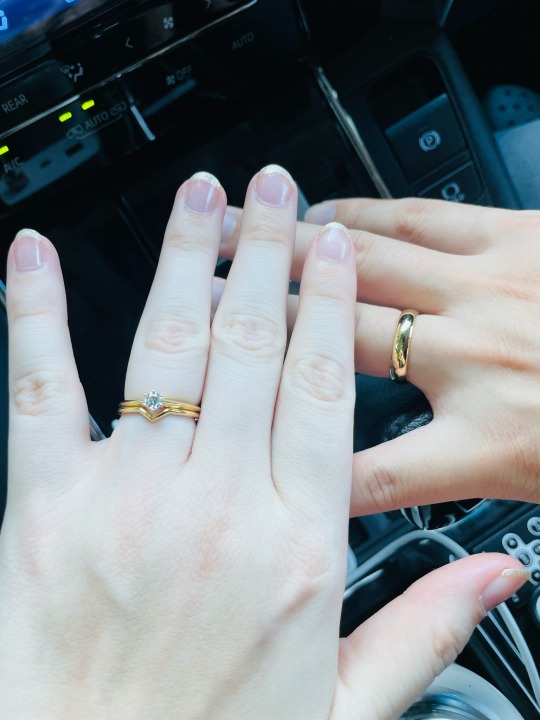
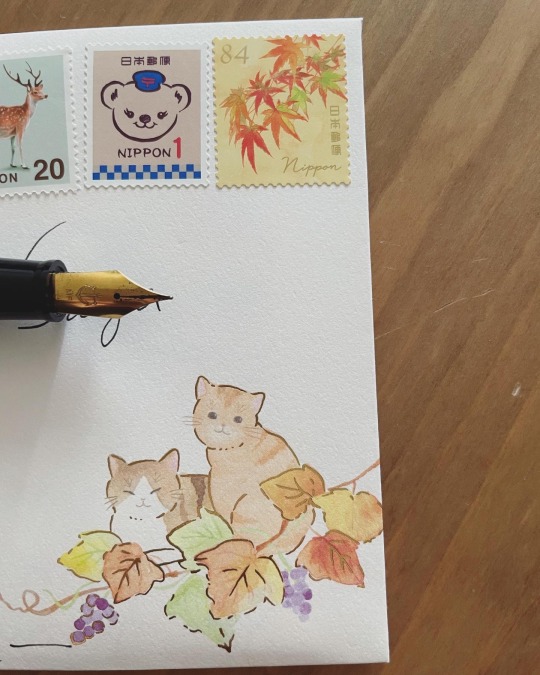
みなさま、お久しぶりです!
フォロワー5000人超えてしまった。たまにしか投稿しないのにね。みなさま、ありがとうございます🙇♀️
せ��かくだから、何年前からやってない自己紹介をしようと思います。
初めまして!
オレンジでございます。30歳のノルウェー人で、5年間日本に住んでいます。前は愛知県も長野県も住んでいましたが、今は東京で働いています。
日本語を勉強するきっかけは小説が好きだからでした。村上春樹の本の全部を英語で読んで、「日本語で読んでみたい、どのぐらい違うかな」ってことでした。今は村上春樹より、他の作家さんと出会って愛読しています🙈
趣味は上にも述べたけど、読書。他によくしていることは、紅茶を飲んだり (本を読みながらw) 、片付けたり (家がいつも綺麗わけではないけど)、手紙を書いたり (日本の切手も好き)、料理とベーキングしたり、時々ハイキングしたりします。
好きなものは、愛猫のダージリンちゃん、甘いもの、文具、ミルクティー、手帳、秋、オレンジ色、編み物など。
今年 (2022年) やったことは結婚したことと運転免許を取得したことです(日本語で取得しました!ちょっと自慢させてください)。
そろそろ日本語能力試験を取得したいと思います。なぜかというと、日本語能力試験の本を手放したいだけです。あまりろくな理由ではないですけど、取得できずに手放すには気が進まないと感じます。
みなさま、よろしくお願い致します🙇♀️
Long time no post!
Even though I only post once in a while, I now have over 5000 followers. Thank you so much!
Since I haven’t done one in years, I thought it would be a good opportunity to do a new self introduction! So,
Hello!
I’m «orange». A 30year old Norwegian that has been living in Japan for 5 years now. Previously I lived in Aichi and Nagano prefectures, but now I work in Tokyo.
The reason I started studying Japanese was for my love of novels. I read all of Haruki Murakami’s books in English and thought «I want to read these in Japanese, I wonder how different they are». Now I am enjoying other Japanese authors maybe even more than Haruki Murakami🙈
Hobbies are, as stated above as well; reading. I also often drink tea (while reading), tidy and organize (not to say that my house is always tidy and clean), write letters (I also love Japanese stamps), cook and bake, and sometimes go hiking.
Things I love; my beloved cat Darjeeling, sweets, stationery, milk tea, planners, autumn, the colour orange, crafts etc.
Things I did in 2022; got married and got my driver’s license! (I got the license all in Japanese! Please excuse my bragging just this once haha)
I want to pass the jlpt soon, mostly just to be able to get rid of all the jlpt textbooks I have. While it is not the best reason, I feel like I can’t get rid of them without having passed so.
Yoroshiku everyone!🙇♀️
#japanese#studyblr#langblr#japanese studyblr#japanese langblr#study#japaneseblr#japanese study#勉強#日本語#japanese language#japan#book#cat#jlpt#language#jlpt n1
84 notes
·
View notes